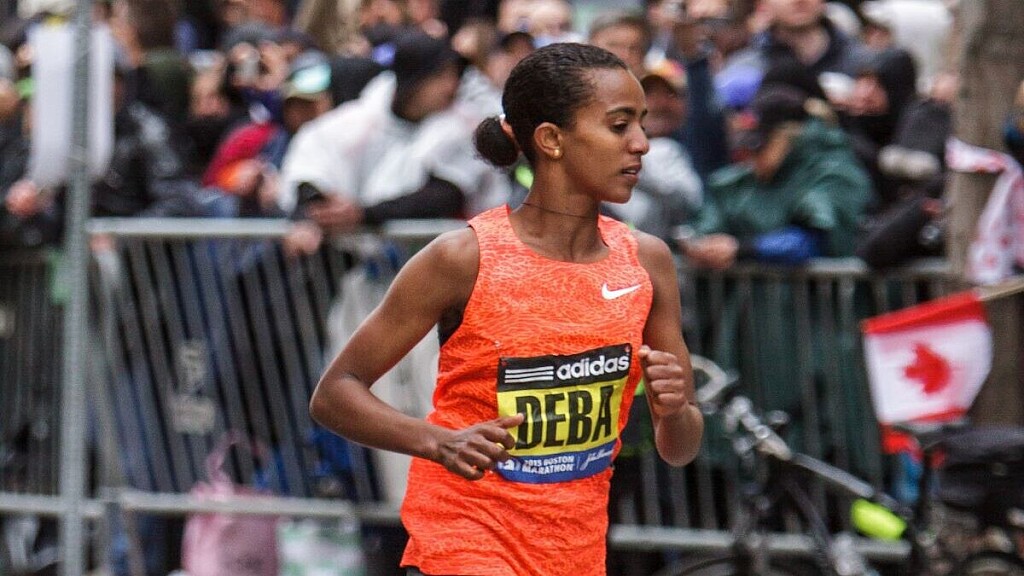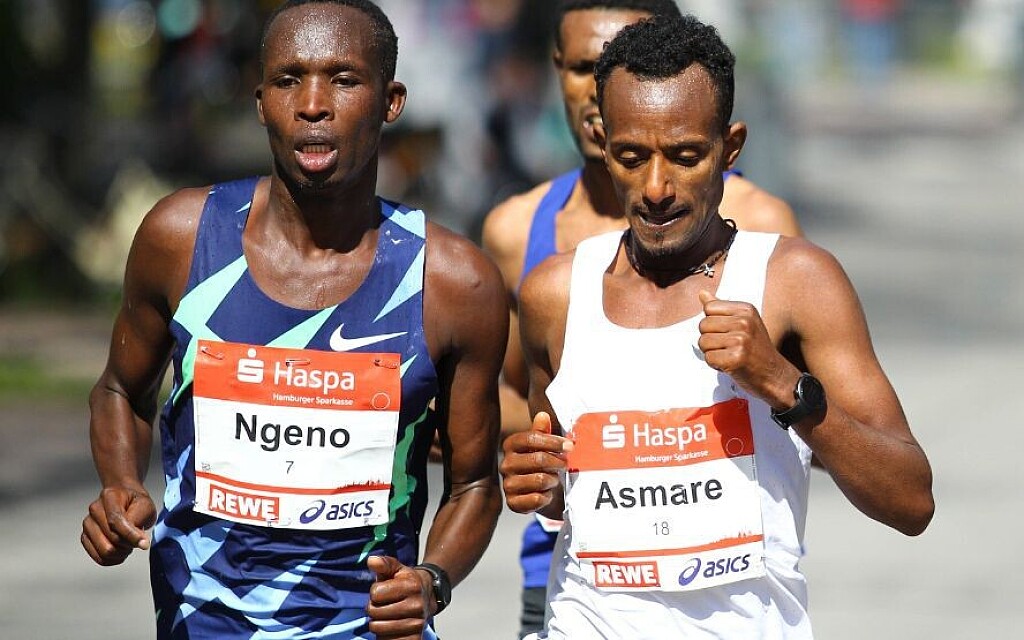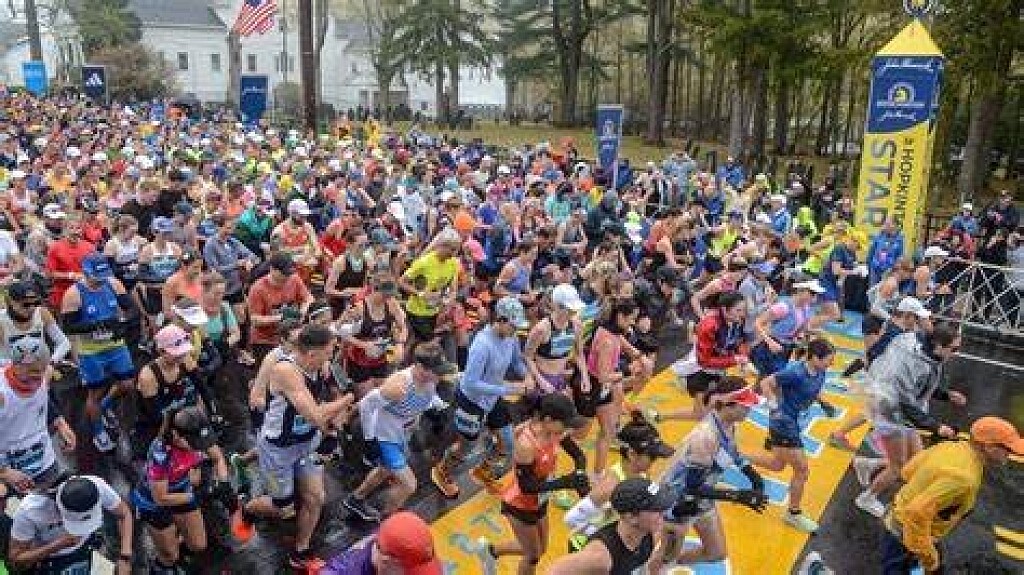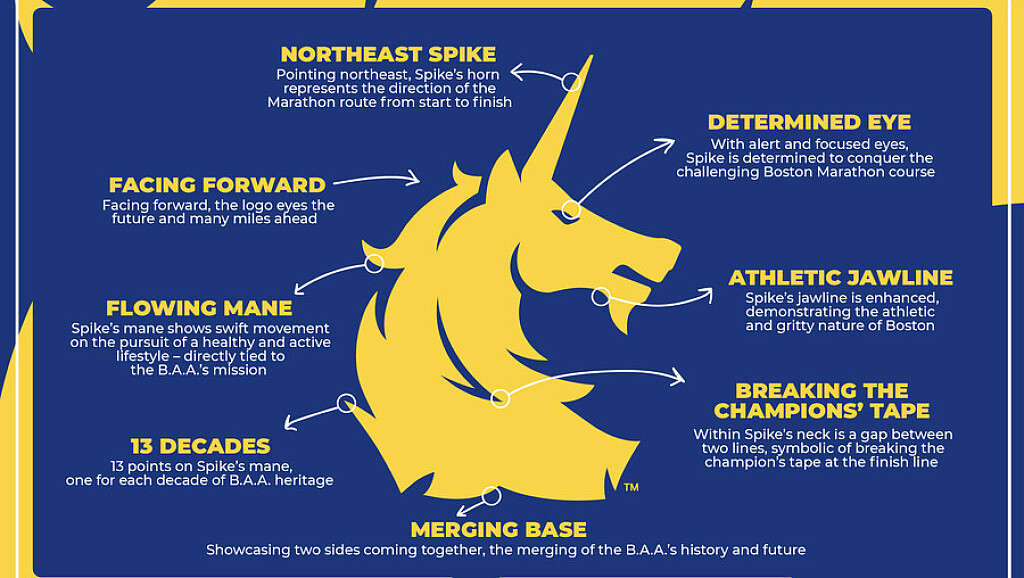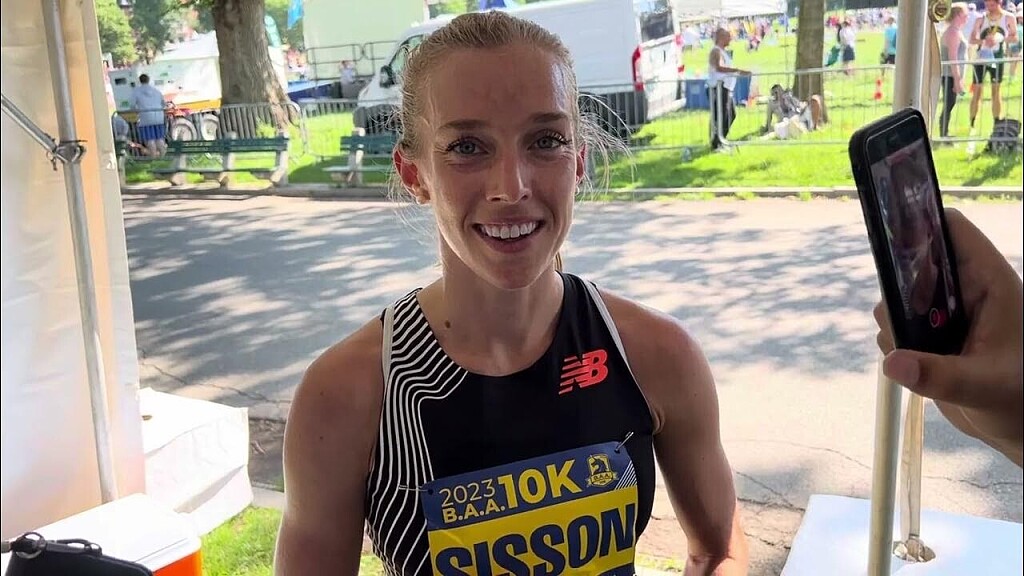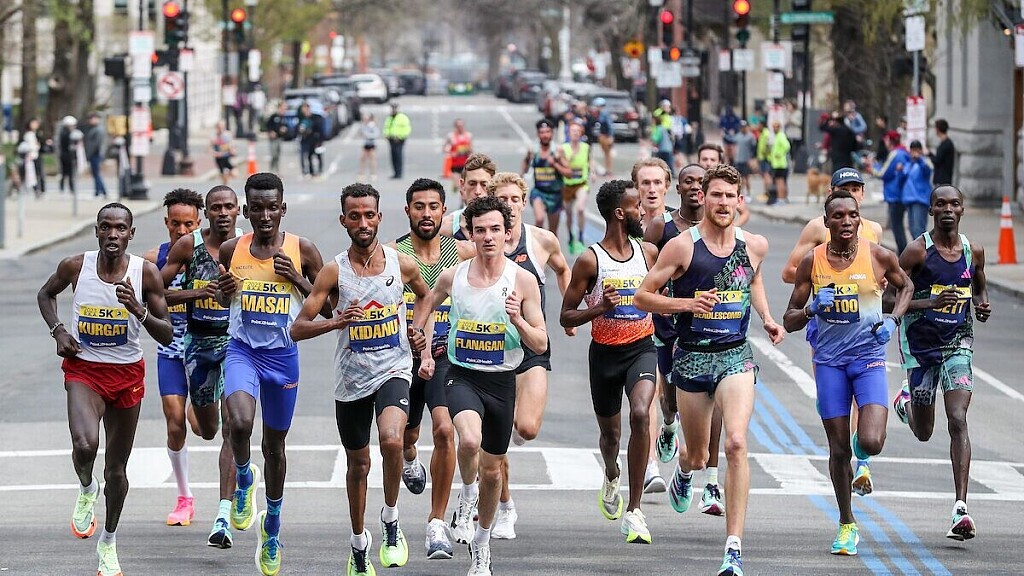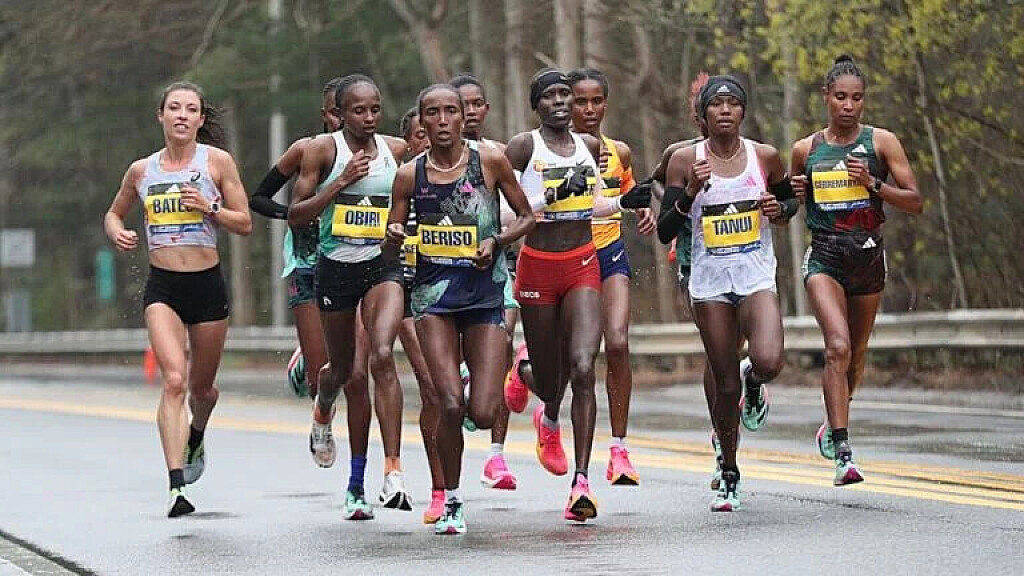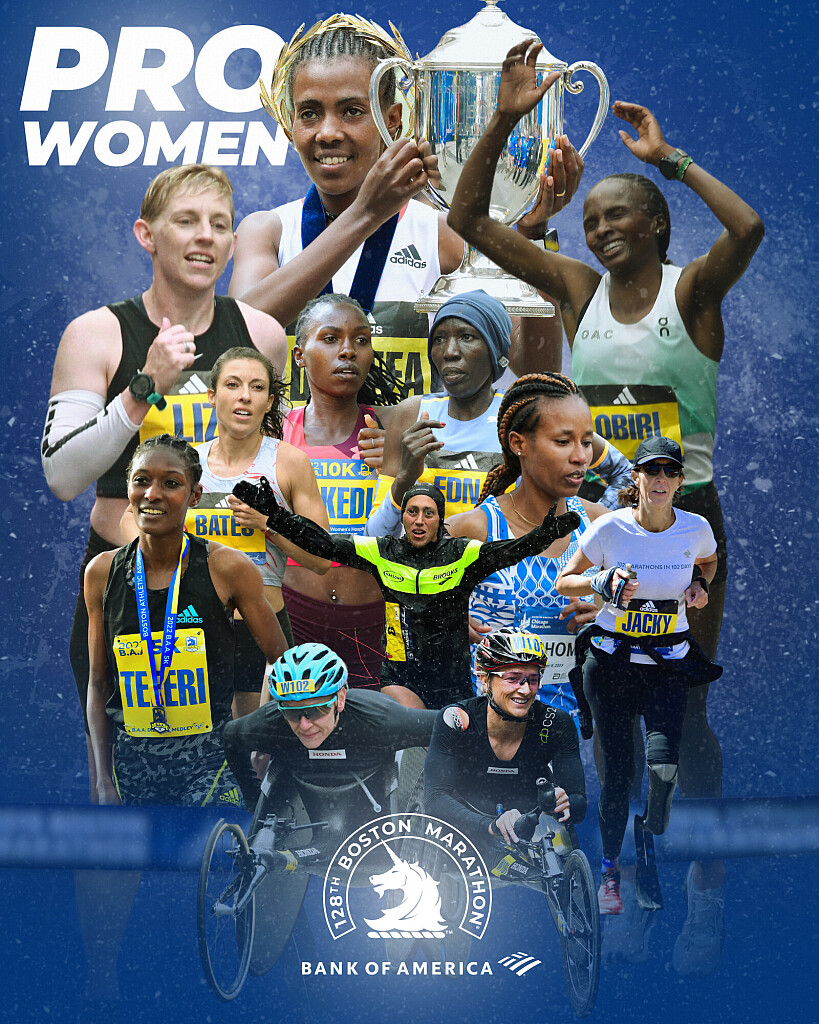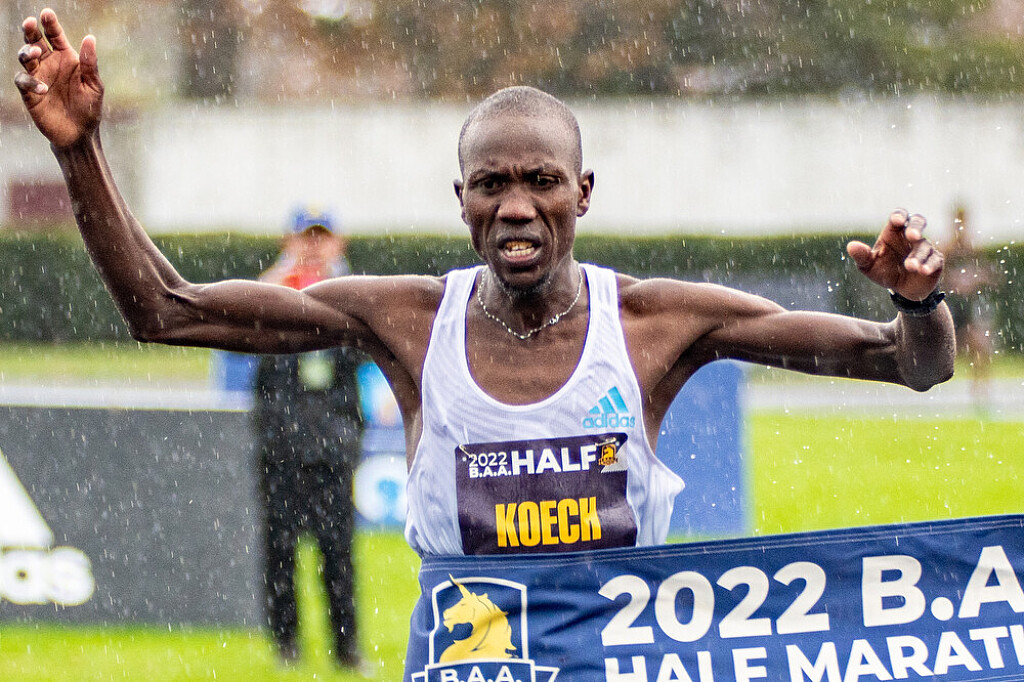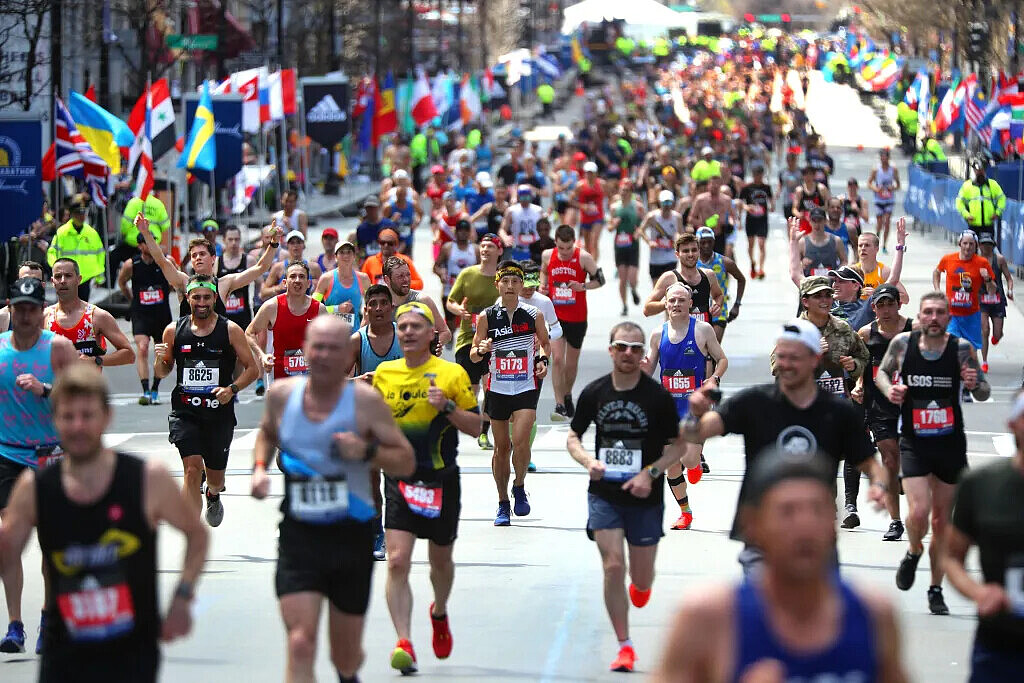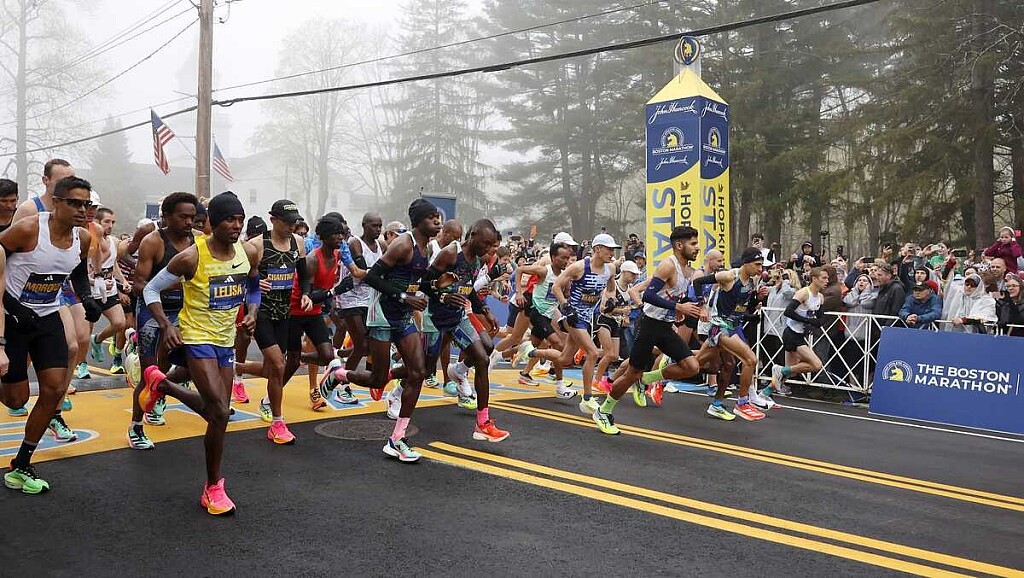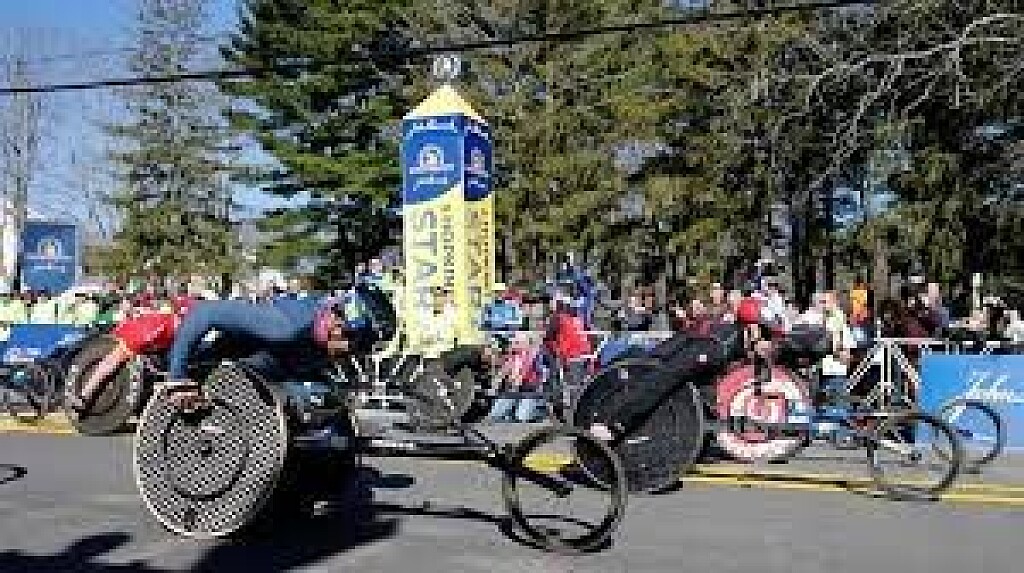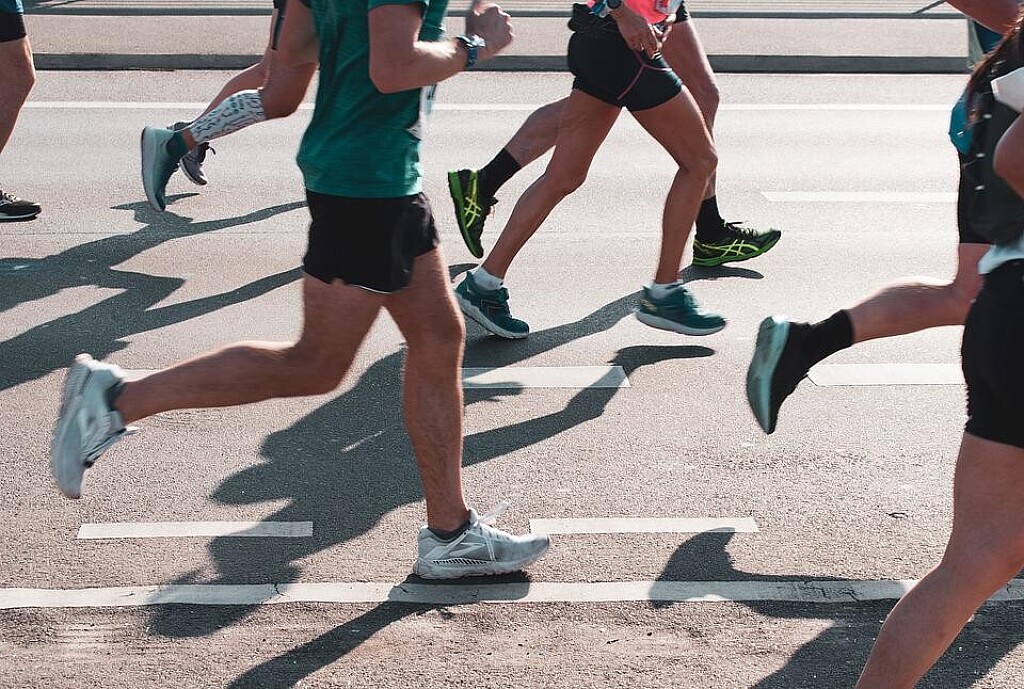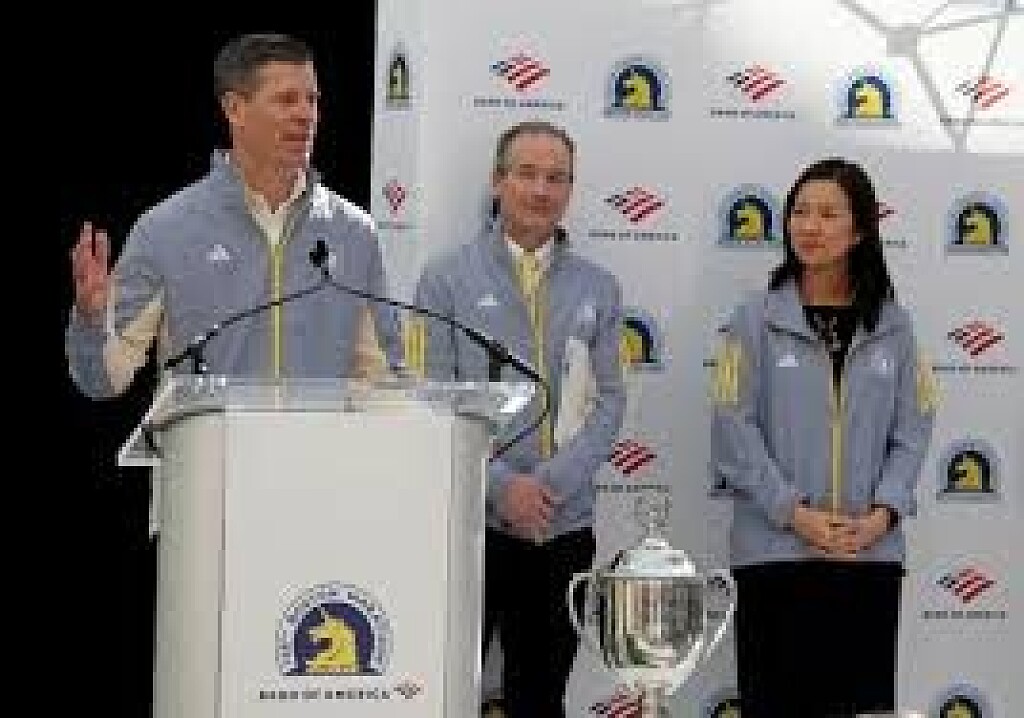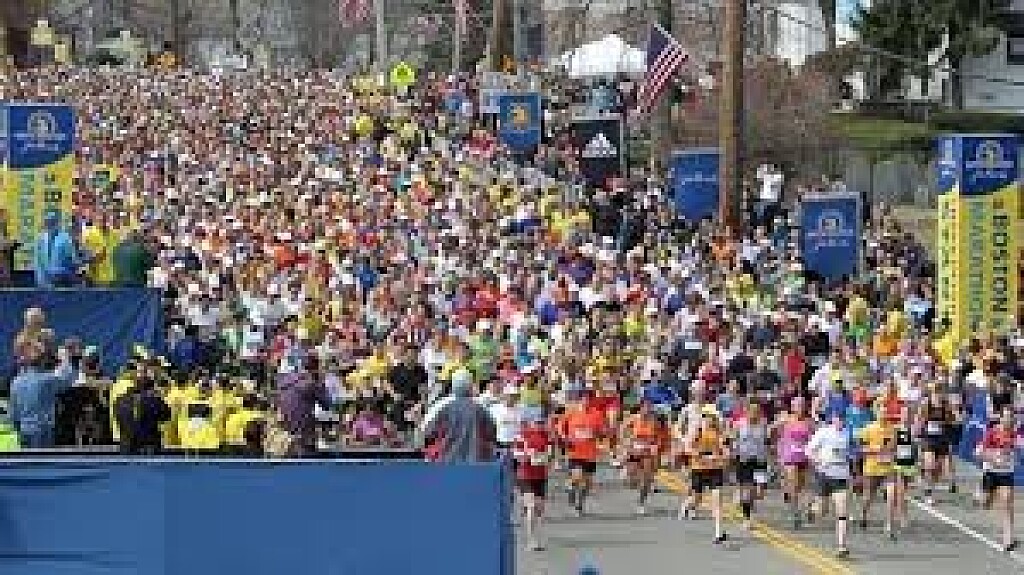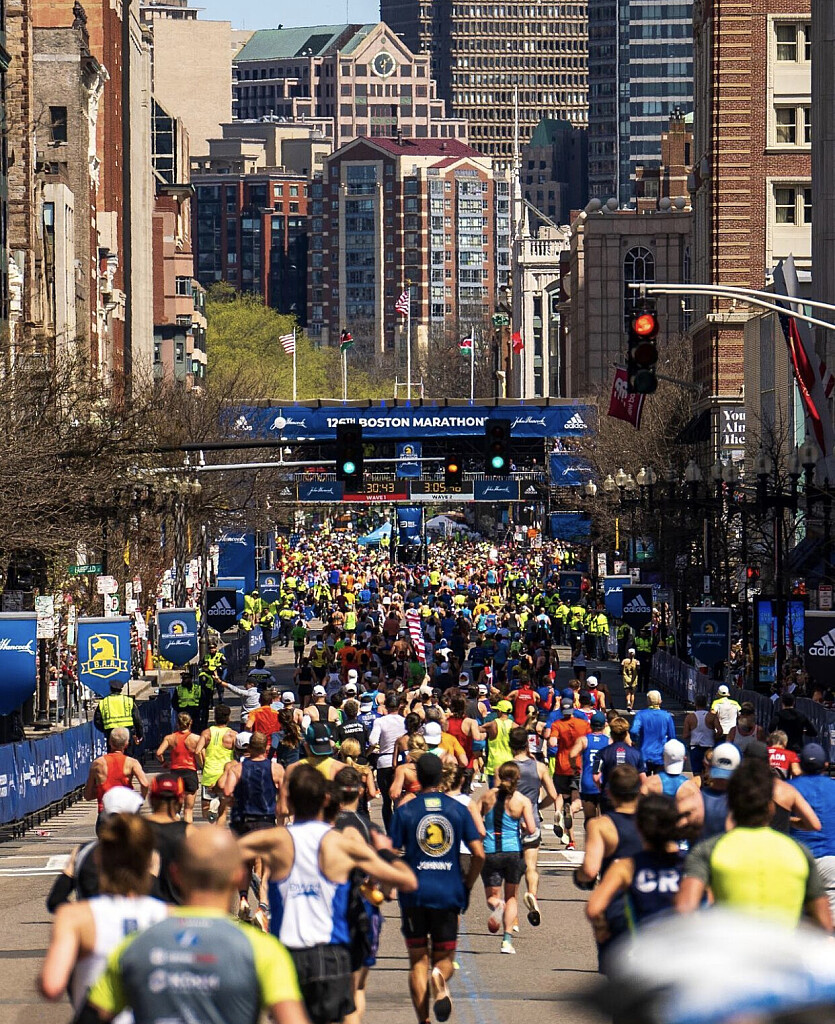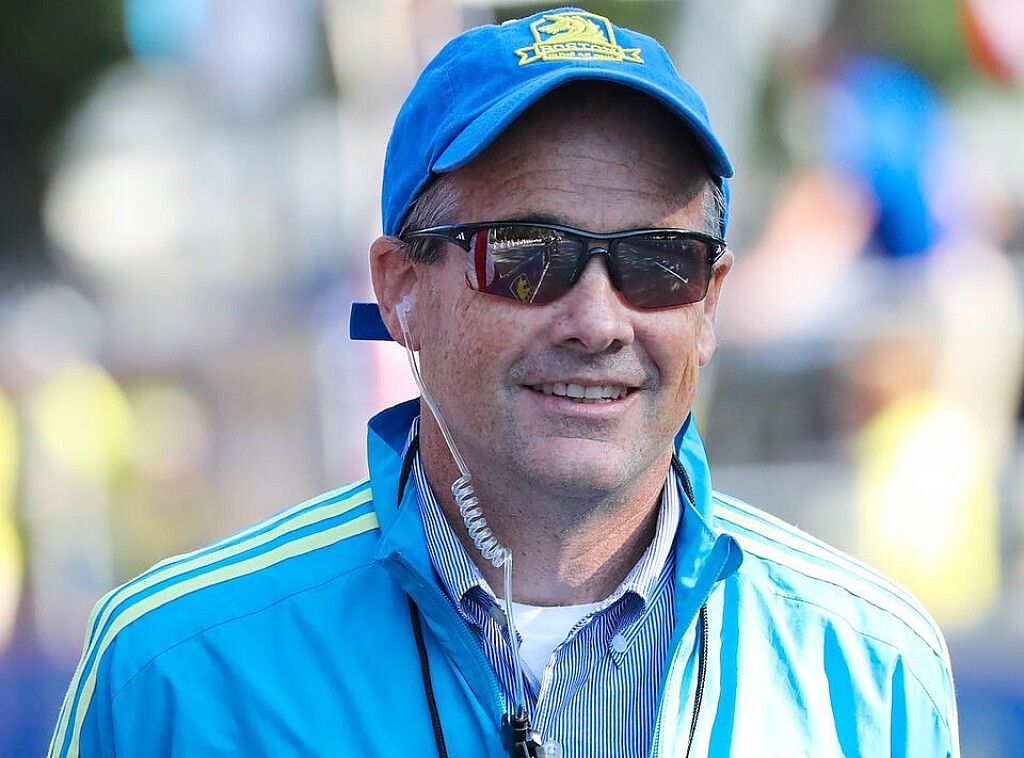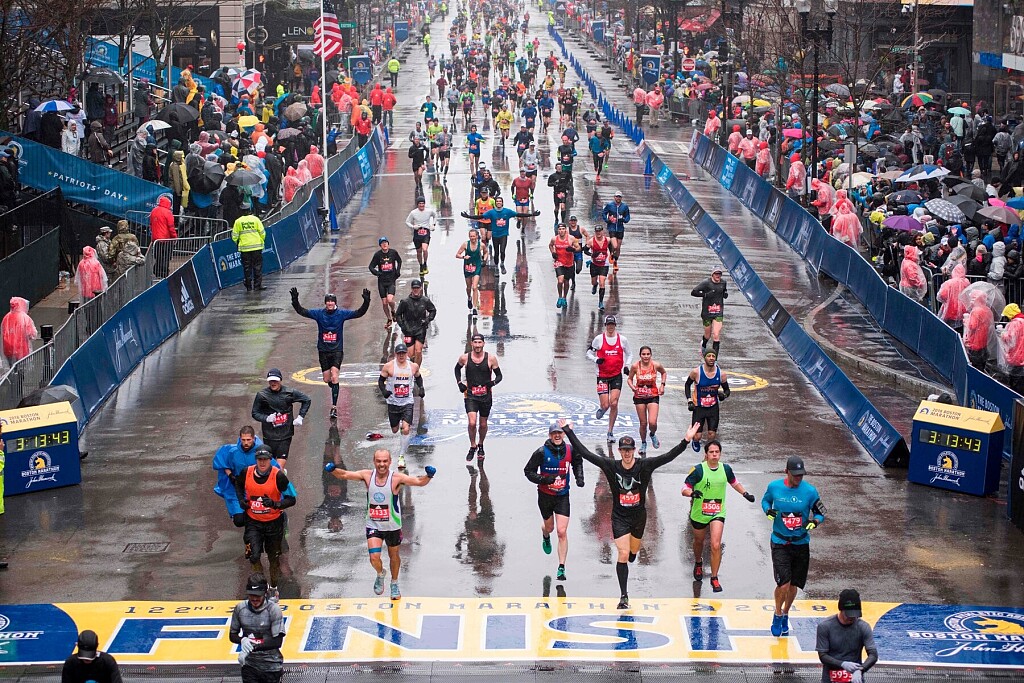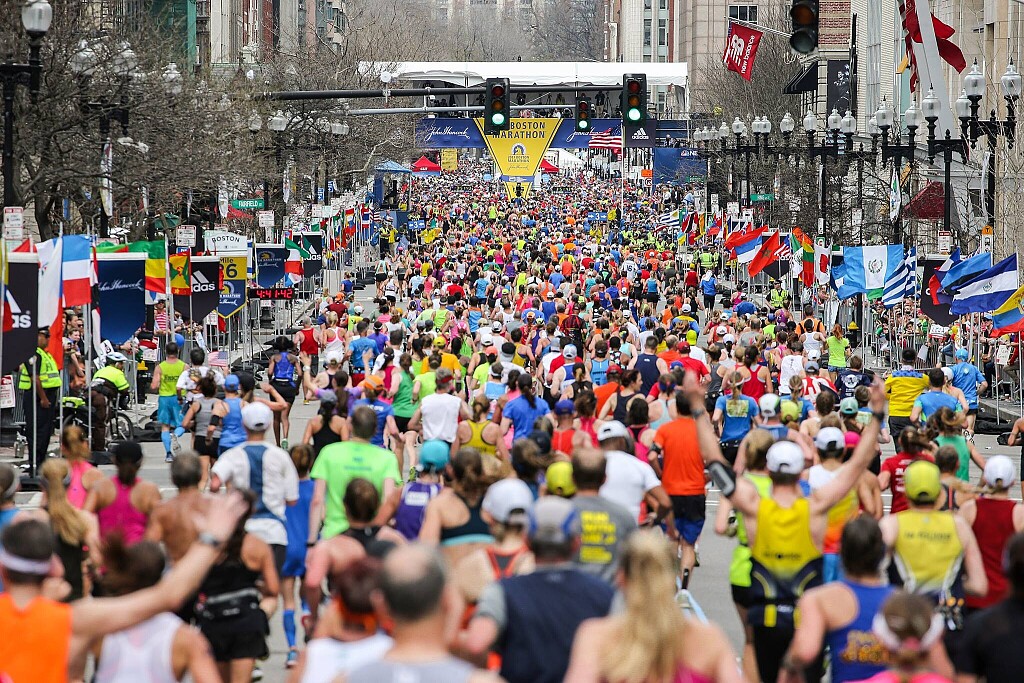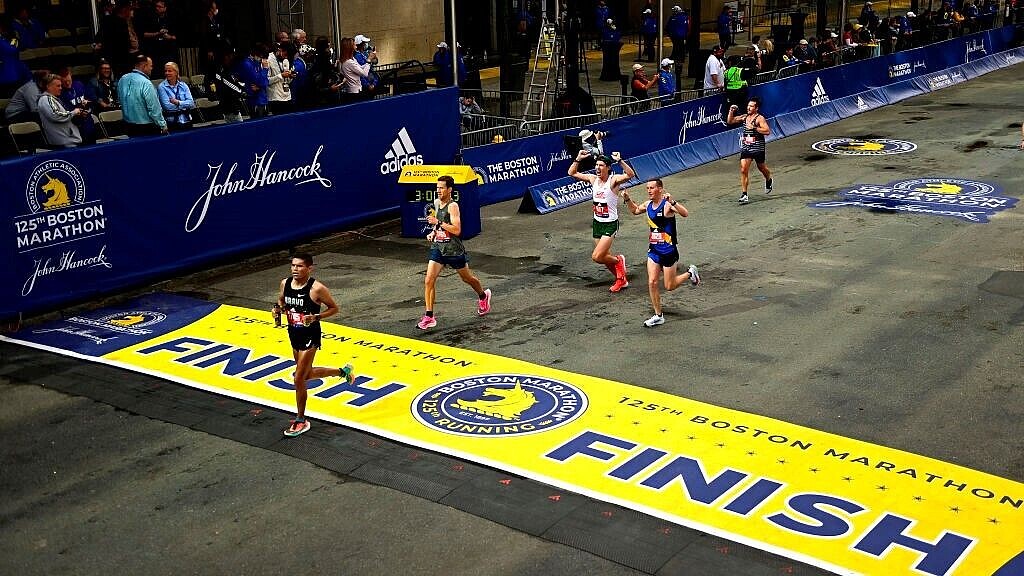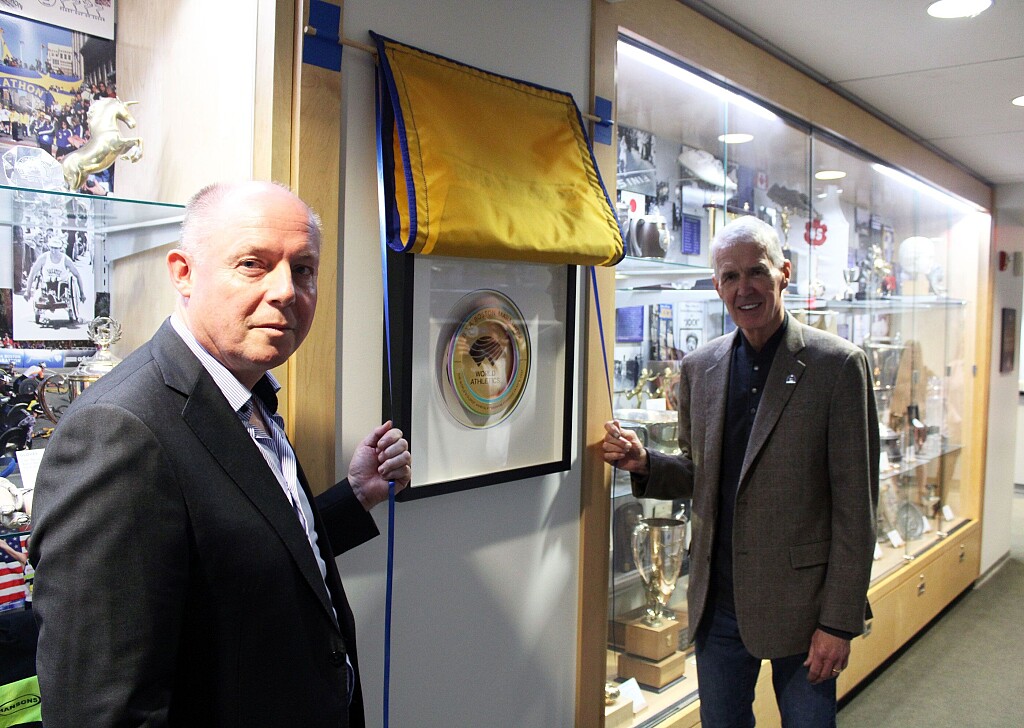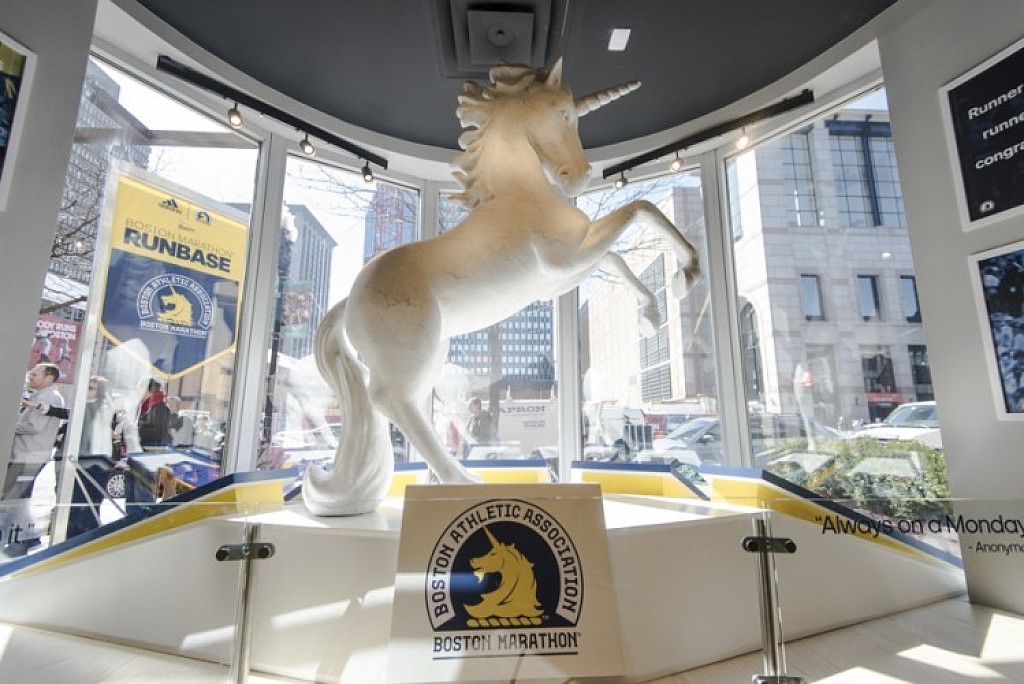Running News Daily
Running News Daily is edited by Bob Anderson. Send your news items to bob@mybestruns.com Advertising opportunities available. Train the Kenyan Way at KATA Kenya and Portugal owned and operated by Bob Anderson. Be sure to catch our movie A Long Run the movie KATA Running Camps and KATA Potato Farms - 31 now open in Kenya! https://kata.ke/
Index to Daily Posts · Sign Up For Updates · Run The World Feed
Articles tagged #Jack Fleming
Today's Running News
2014 Boston Marathon winner to finally receive prize money
10 years after setting the course record, Ethiopia's Buzunesh Deba will be awarded her prize money through the B.A.A.'s new voluntary payments initiative.
On Tuesday, the Boston Athletic Association (B.A.A.), which organizes the Boston Marathon, announced new plans to address prize money discrepancies caused by doping offences over the past 40 years. Starting in January 2025, the B.A.A. will begin issuing voluntary payments to athletes whose results were re-ranked due to disqualifications, dating back to 1986—the year prize money was first introduced.
This announcement is significant for Ethiopian runner Buzunesh Deba and Kenyan athlete Edna Kiplagat, who were both elevated to first place after Kenya’s Rita Jeptoo (2014) and Diana Kipyokei (2021) were disqualified for doping. In Deba’s case, she was originally awarded the second-place prize, but was later recognized as the winner of the 2014 race; she also set the course record of 2:19:59. Despite this, Deba has waited nearly a decade to receive the USD $100,000 owed to her: $75,000 for first place and $25,000 for the course record.
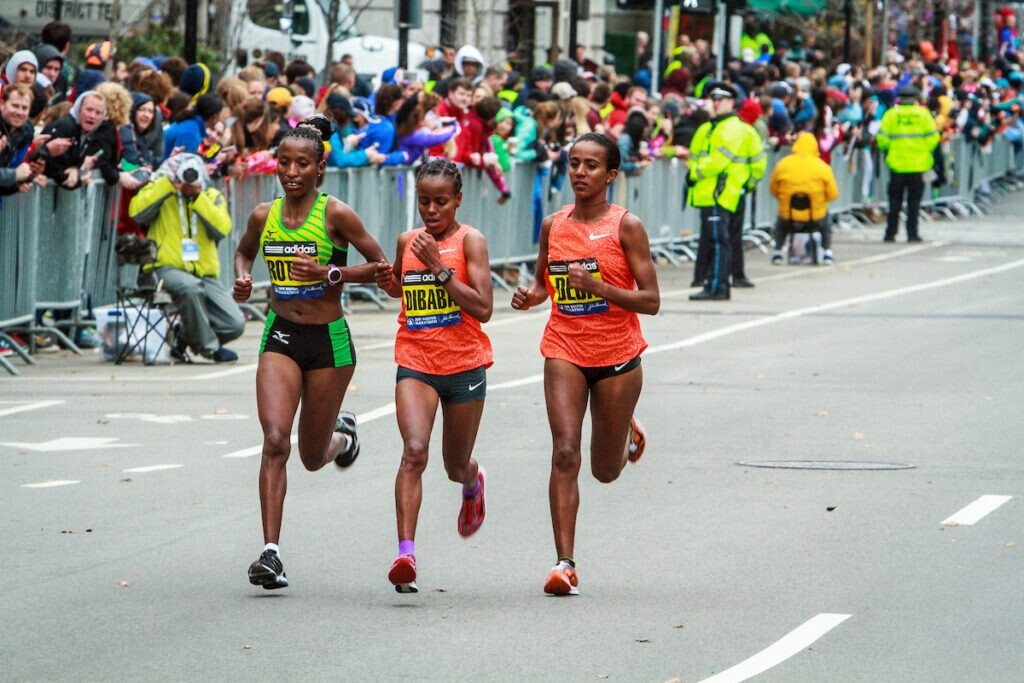
Deba’s payment, set to be issued in January, will be the largest compensation under the B.A.A.’s voluntary payout program. Earlier this year, a Wall Street Journal article put a spotlight on the B.A.A., sharing Deba’s 10-year wait for the prize money. The story caught the attention of Philadelphia businessman Doug Guyer, who sent Deba a USD $75,000 cheque to cover the difference between the first- and second-place prizes.
Jack Fleming, B.A.A. president and CEO said in a press release, “Our initiative aims to ensure that clean athletes are compensated appropriately. While the process to reclaim and redistribute prize money has been challenging, it remains essential to uphold fair competition.”
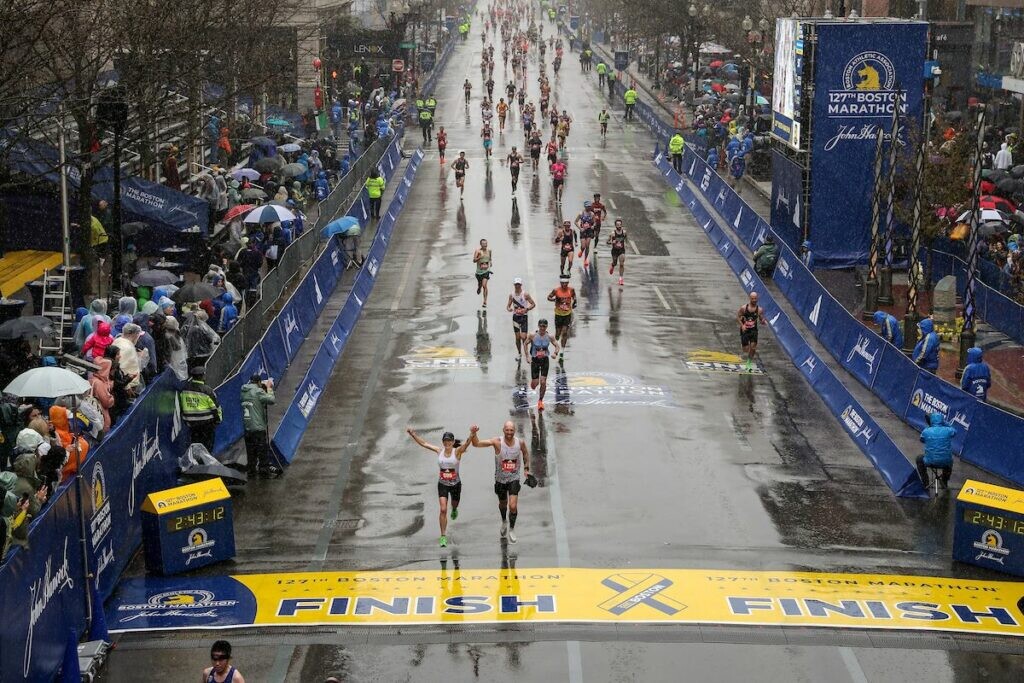
Eighty runners from eight Boston Marathons and nine participants from the Boston 5K event are eligible to receive payments totalling USD $300,000. Athletes found guilty of doping offences at any time will be ineligible for compensation. The B.A.A. says it will seek to reclaim payments from any recipient later disqualified.
The B.A.A. collaborates with global anti-doping organizations, including the Athletics Integrity Unit (AIU), the World Anti-Doping Agency (WADA) and the U.S. Anti-Doping Agency (USADA), to ensure a level playing field at its events. Notably, no male Boston Marathon champion has been stripped of their title for doping.
by Marley Dickinson
Login to leave a comment
Bernard Ngeno headlines strong men's field for Boston Half Marathon
Thousands of athletes, including top contenders like Bernard Ngeno and Melknat Wudu, will compete in the Boston Half Marathon on November 10, with elites aiming for records and personal bests.
Thousands of athletes will be looking to make an impression at the Boston Half Marathon on Sunday, November 10.
The men’s race boasts four men who have clocked personal bests under one hour. Headlining the field will be Bernard Ngeno who has a personal best time of 59:07 minutes. Isaac Kipkemboi (Kenya, 59:17), Bravin Kiptoo (Kenya, 59:37) and American Leonard Korir are also some of the headliners of the field.
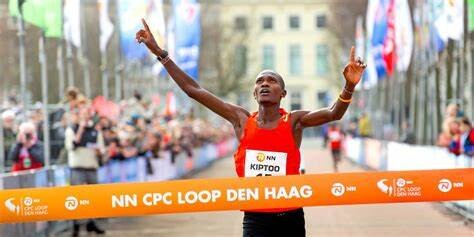
Bernard Ngeno is fresh from racing at the Principality Cardiff Half Marathon where he finished 15th. He is one of the most decorated road runners and has won eight international half-marathons. On his part, Leonard Korir has represented Team USA at two Olympic Games, including at the Paris Olympic Games.
Others confirmed for the event include Ben Flanagan of Canada and Yemane Haileselassie from Eritrea and they are both familiar with the roads. Flanagan finished second at the 2023 Boston 5K while Haileselassie was third at last year’s Boston Half Marathon.
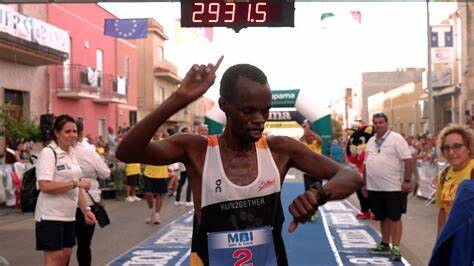
Others confirmed for the race include Sam Chelanga who was third at the 2012 Boston Half Marathon and seventh last year. Daniel Mesfun finished 15th at the U.S. Olympic Trials Marathon.
The women’s race is headlined by Ethiopia’s Melknat Wudu who is fresh from winning the 10km title and she will be back to make her half marathon debut. Wudu ran 31:15 to win the race and is a two-time World Junior Championships silver medalist on the track.
She will be up against fellow Ethiopians including Mestawat Fikir and Bosena Mulatie, the duo who finished second and third at last month’s Berlin Marathon.
Uganda’s Sarah Chelangat, Ethiopians Fentaye Belayneh and Mebrat Gidey, and Britain’s Calli Hauger-Thackery will also be in the race. Chelangat placed 12th at the 2024 Olympic 10,000m, while Belayneh was runner-up at the Boston Half Marathon in 2023 and she will be out to go one place better.
Gidey placed 10th at the 2024 World Cross Country Championships while Hauger-Thackery set a lifetime best 2:21:24 at the Berlin Marathon this year, finishing seventh.
“Nearly 9,000 athletes will take part in this year’s Boston Half, and at the front of the field will be fan favorites striving for event records and personal bests,” said Jack Fleming, President and CEO of the B.A.A.
“We’re eager to welcome competitors from more than 40 countries to the roads of Boston, ranging from the world’s best to those looking to complete their first half marathon.”
by Abigael Wafula
Login to leave a comment
B.A.A. Half Marathon
Dana-Farber and the Jimmy Fund have partnered with the B.A.A. in the Half Marathon for 13 years as the race’s presenting sponsor. Through this relationship, team members have collectively raised more than $5 million to support groundbreaking cancer research, and enabled Dana-Farber scientists and clinicians to positively impact the lives of cancer patients around the world. Dana-Farber runners often participate...
more...Hoping to qualify for the 2026 Boston Marathon? You'll have to run even faster
All age groups under 60 will have to run five minutes faster as demand to participate grows.
Runners hoping to qualify for the 2026 Boston Marathon are going to have to pick up the pace.
The Boston Athletic Association has updated its qualifying times for the world's oldest annual marathon, asking most prospective competitors to run a 42.195 kilometre race five minutes faster than in recent years to earn a starting number.
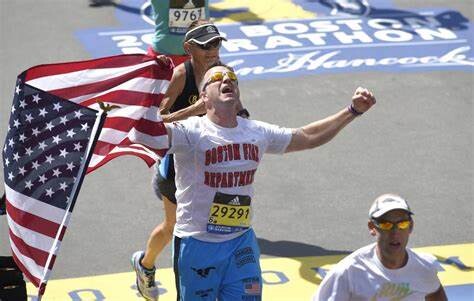
"Every time the BAA has adjusted qualifying standards — most recently in 2019 — we've seen athletes continue to raise the bar and elevate to new levels," Jack Fleming, president and CEO of the BAA, said in a statement posted Monday.
"In recent years we've turned away athletes in this age range (18-59) at the highest rate, and the adjustment reflects both the depth of participation and speed at which athletes are running."
The BAA introduced qualifying times in 1970 and has expanded and adjusted the requirements through the decades.
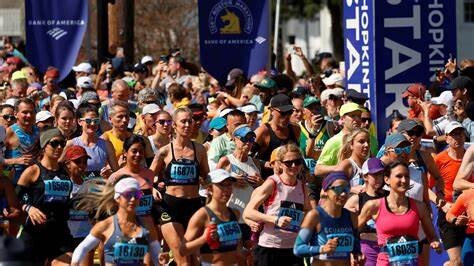
Runners participating in the event to raise money for charity do not have to meet the qualifying standards.
All age groups up to age 60 will be required to run five minutes faster than in previous years. This means men between the ages of 18 and 34 will have to run a marathon during the qualification window in two hours, 55 minutes or faster to earn a spot in the 2026 race.
Women and nonbinary applicants age 18-34 need to complete the distance in three hours, 25 minutes.
The BAA said it decided to tighten its times after turning away "thousands of runners" in the past who met the qualifying time. In his statement, Fleming said athletes have gotten faster, the sport of marathon running is growing and so is demand to participate in the Boston Marathon.
Athletes are getting faster
The qualifying times for runners age 60 to 80-plus didn't change. The slowest competitors that can earn qualification are in the 80 and over age group. The men in that category must complete a marathon in four hours, 50 minutes, while women and nonbinary competitors must finish in five hours, 20 minutes.
The BAA said it had 36,406 qualifier entry applications for next year's race, more than ever before.
"The record number of applicants indicates the growing trend of our sport and shows that athletes are continuously getting faster and faster," Fleming said.
The qualifying window for the 2026 race began on Sept. 1 and will run through the conclusion of the registration period of that race next September.
Next year's Boston Marathon will take place on April 21.
by The Associated Press
Login to leave a comment
Boston Marathon
Among the nation’s oldest athletic clubs, the B.A.A. was established in 1887, and, in 1896, more than half of the U.S. Olympic Team at the first modern games was composed of B.A.A. club members. The Olympic Games provided the inspiration for the first Boston Marathon, which culminated the B.A.A. Games on April 19, 1897. John J. McDermott emerged from a...
more...Boston Athletic Association unveils revised unicorn logo for Boston Marathon
On the occasion of Global Running Day, the Boston Athletic Association is unveiling a revised version of its iconic unicorn logo.
B.A.A. officials said the new logo is intended to be a forward-facing and athletic symbol of the organization's future.
"Between our mass participatory events and our support of philanthropic organizations, we aim to spearhead continued growth and enthusiasm around the sport of running while supporting those around us," said Jack Fleming, B.A.A. President and CEO.
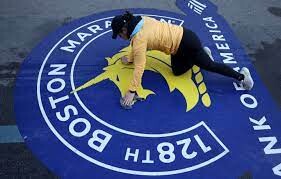
Elements of the new logo include:
Facing forward, the emblem eyes the future and many miles ahead.
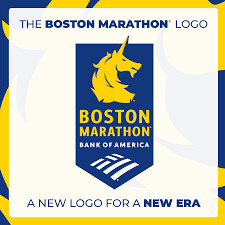
Spike’s jawline is enhanced, demonstrating the athletic and gritty nature of Boston.
With alert and focused eyes, Spike is determined to conquer the challenging Boston Marathon course.
Pointing northeast, Spike’s horn represents the direction of the Marathon route on a compass from start to finish.
The flowing mane shows swift movement on the pursuit of a healthy and active lifestyle – directly tied to the B.A.A.’s mission.
The new base of the unicorn showcases two sides coming together, the merging of the B.A.A.’s history and future.
Within Spike’s neck is a gap between two lines, symbolic of breaking the champion’s tape at the finish line.
13 points are on the mane, one for each decade of B.A.A. heritage.
B.A.A. officials said the finish line on Boylston Street is being repainted Wednesday to feature the updated logo.
WCVB is the official broadcast partner of the B.A.A. and the Boston Marathon.
by Phil Tenser
Login to leave a comment
Boston Marathon
Among the nation’s oldest athletic clubs, the B.A.A. was established in 1887, and, in 1896, more than half of the U.S. Olympic Team at the first modern games was composed of B.A.A. club members. The Olympic Games provided the inspiration for the first Boston Marathon, which culminated the B.A.A. Games on April 19, 1897. John J. McDermott emerged from a...
more...Boston Athletic Association names field of professional athletes for 2024 Boston 10K
The Boston Athletic Association announced Wednesday the professional fields for the 2024 Boston 10K, which will be held on Sunday, June 23.
American Olympic marathoners Emily Sisson and Clayton Young will race the new and enhanced course that features scenic views of the Charles River and finishes at Boston Common.
Making his American road racing debut is world-number one ranked road racer Sabastian Sawe, of Kenya, and returning is defending Boston Half champion Abel Kipchumba. 2024 Boston Marathon runner-up Sharon Lokedi and two-time Boston Marathon champion Edna Kiplagat headline the women’s field, while Para Athletics Division winners Marko Cheseto Lemtukei, Atsbha Gebremeskel and Kelly Bruno will compete two months after finishing April’s marathon.
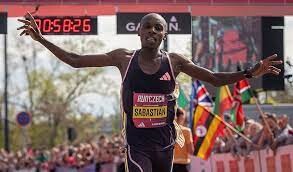
“The Boston 10K presented by Brigham and Women’s Hospital kicks off the summer running season,” said Jack Fleming, the president and CEO of the B.A.A. “We’re eager for participants to take on the new course, which will run along the Charles River, over two historic bridges, and across the Boston Marathon finish line before finishing at Boston Common. Leading the way are some of the fastest and most accomplished athletes to race 6.2 miles, some doing so as a tune-up for the Olympic and Paralympic Games.”
Sisson and Young locked up their spots on Team USA’s Marathon roster in February, both finishing second in their respective women’s and men’s races. Sisson returns to the Boston 10K after placing second in 2022 and fourth in 2023, while this will be Young’s first B.A.A. event.
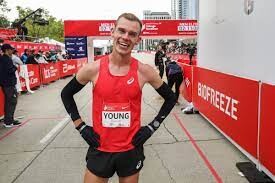
From Kenya are Lokedi and Kiplagat, racing in Boston two months after placing on the podium at the 128th Boston Marathon presented by Bank of America. Lokedi is currently the alternate for Kenya’s Olympic Marathon team, and Kiplagat has twice finished runner-up at the Boston 10K. Joining them among international competitors are last year’s Boston 10K second-place finisher Stacy Ndiwa (Kenya), Cherry Blossom 10 Mile champion Sarah Chelangat (Uganda), 2022 Beach to Beacon 10K winner Fantaye Belayneh (Ethiopia), and 2021 Olympic 10,000m sixth place finisher Irine Cheptai (Kenya). Mercy Chelangat, an NCAA Cross Country and 10,000m champion from Kenya, and 2022 Boston Half third-place finisher Hiwot Gebremaryam (Ethiopia) are entered as well.
From the USA is 2015 Boston Marathon champion Caroline Rotich, B.A.A. High-performance team member Abbey Wheeler, 2024 USA 15K third-place finisher Emily Durgin and former American 10,000m record holder and U.S. Olympian Molly Huddle.
The men’s international field is headlined by Sabastian Sawe, the top-ranked road racer in the world and the 2023 World Athletics Half Marathon champion. Sawe, of Kenya, has run 26:49 — fastest in the field — and will be making his American road racing debut.
From Kenya are Boston Half reigning champion Abel Kipchumba, 2023 Falmouth Road Race winner Wesley Kiptoo, and 17-time NCAA champion Edward Cheserek. Also from Kenya is Alex Masai, third in 2023.
Beyond Clayton Young, American men on the starting line will include recent USA 25K national champion Diego Estrada, 1:00:02 half marathoner Teshome Mekonen, and B.A.A. High Performance Team member Josh Kalapos. Kalapos finished 17th at February’s U.S. Olympic Team Trials – Marathon.
Hermin Garic returns in the men’s wheelchair division as a two-time defending champion, timing 22:44 last year. He’s joined by Michelle Wheeler, a top entrant in the women’s wheelchair division, who was runner-up last year.
In the Para Athletics Divisions, Brian Reynolds — who set a world record 41:09 at last year’s event for T61-64 Classification (lower-limb impairment) is back with sights on the podium again. Marko Cheseto Lemtukei and Kelly Bruno — each of whom won the T62-T64/T42-T44 Division at the 128th Boston Marathon — will compete, as well as Atsbha Gebremeskel, the two-time Boston Marathon T46 (upper limb impairment) Para Athletics Division champion. More than 25 athletes will participate in the Para Athletics Divisions and Adaptive Programs at this year’s Boston 10K. Nearly $20,000 — an event record — in prize awards are available to top-three finishers across Vision Impairment (T11-T13), Upper Limb Impairment (T45-T46), Lower Limb Impairment (T61-T64), Coordination Impairment (T35-T38) classifications.
The Boston 10K presented by Brigham and Women’s Hospital will be the second event of the 2024 B.A.A. Distance Medley, a year-long series featuring the Boston 5K (April), Boston 10K (June), and Boston Half (November). While open registration is sold out, limited spots are still available through Brigham and Women’s fundraising team.
by Jamy Pombo Sesselman
Login to leave a comment
B.A.A. 10K
The 6.2-mile course is a scenic tour through Boston's Back Bay. Notable neighborhoods and attractions include the legendary Bull and Finch Pub, after which the television series "Cheers" was developed, the campus of Boston University, and trendy Kenmore Square. ...
more...More Than 100 Professional Athletes to Race Boston 5K
Fast fields featuring Olympians, Paralympians, rising stars, and recent B.A.A. event winners will take center stage at the Boston 5K presented by Point32Health and B.A.A. Invitational Mile on Saturday, April 13. The deepest professional field in race history will include more than 100 accomplished athletes from 19 nations, set to square off for prize money and awards in the open, wheelchair, and Para Athletics Divisions.
“More than 40,000 athletes will take part in B.A.A. races across Boston Marathon weekend,” said Jack Fleming, President and Chief Executive Officer of the B.A.A. “Saturday’s Boston 5K and B.A.A. Invitational Mile fields feature some of the fastest American and international stars, many who are aiming to compete at the Olympics and Paralympics in Paris.”
A new champion will be crowned and the stage is set for another close race at the Boston 5K. Ben Flanagan (Canada), Edwin Kurgat (Kenya), and Alex Masai (Kenya) – all top-five finishers a year ago – will return. They were at the front of an exciting finish a year ago that saw the top 13 men come across the line within ten seconds of the winner.
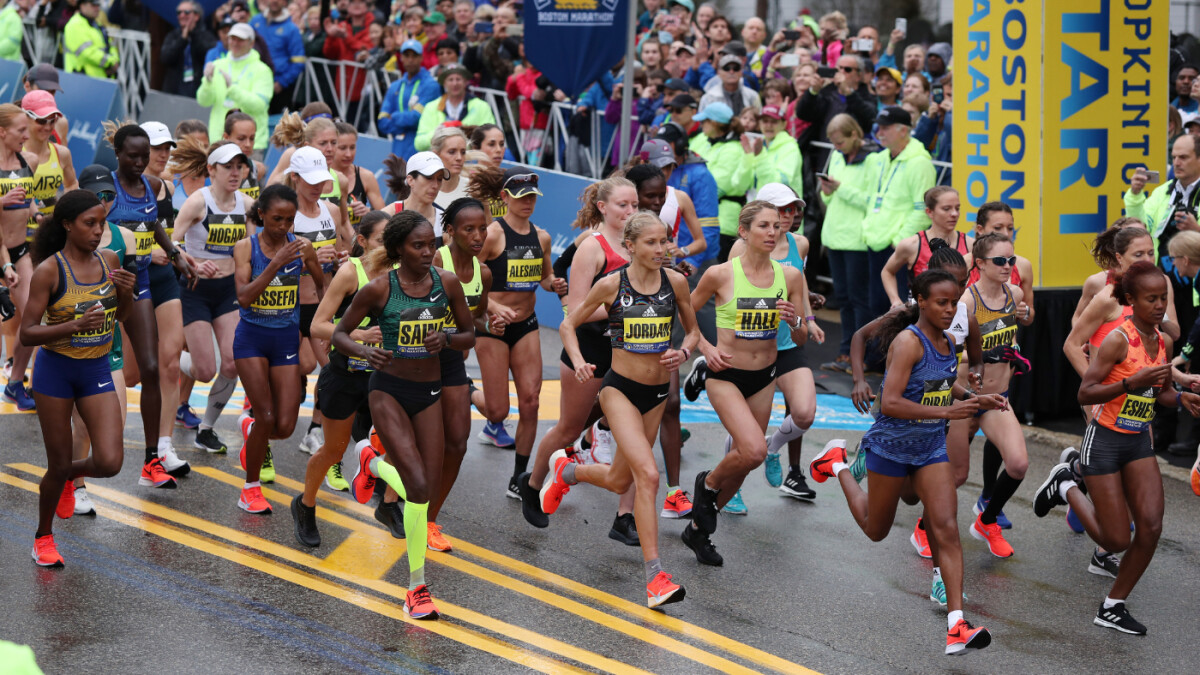
Top Americans Cooper Teare, Zach Panning, and Drew Hunter look to be at the front of the field. Teare is the reigning U.S. club cross country national champion, while Panning led a majority of February’s USA Olympic Team Trials – Marathon and Hunter is a former national champion indoors at 2 miles. B.A.A. High Performance Team members Eric Hamer and Barry Keane will be racing their hometown event.
Also on the start line will be Ben Kigen, an Olympic steeplechase bronze medalist in 2021; Simon Koech, last year’s Diamond League winner in the steeplechase; and Merhawi Mebrahtu, the 5,000m World Junior Championships silver medalist. Ethiopians Getnet Wale and Addisu Yihune are the two fastest men in the field, having gone sub-13:00 on the track for 5,000 meters.
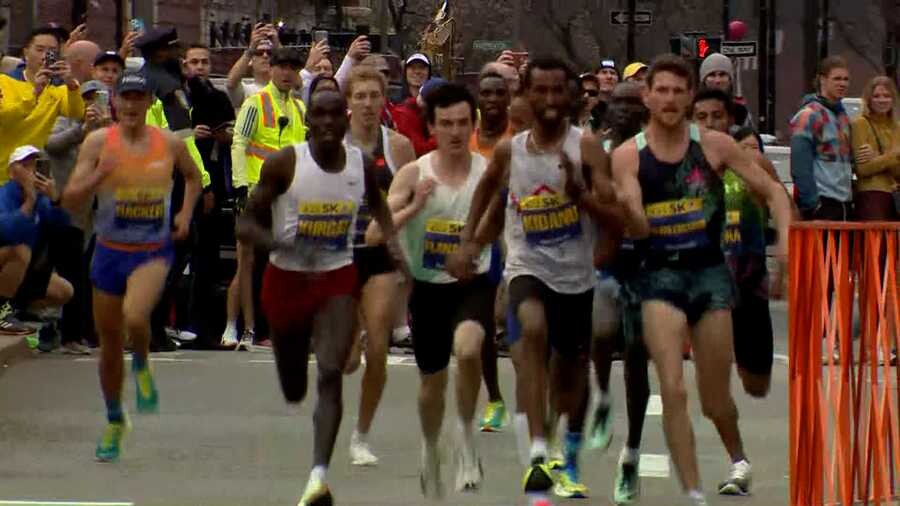
Leading the women’s field is USATF 5K National Champion and B.A.A. High Performance Team member Annie Rodenfels. Joining her are 2024 Team USA Olympic marathoner Dakotah Lindwurm, former American marathon record holder Keira D’Amato, perennial top-American Boston Marathoner Nell Rojas, as well as Team B.A.A. runners Abbey Wheeler, Bethany Hasz Jerde, and Megan Hasz Sailor.
Uganda’s Sarah Chelangat, the Cherry Blossom 10 Mile champion in 2023, and Mercy Chelangat, a former NCAA Cross Country and 10,000m winner, are both entered. Reigning B.A.A. Half Marathon champion Fotyen Tesfay of Ethiopia also comes back to Boston seeking another win.
In the wheelchair division, course record holder and six-time Boston Marathon champion Marcel Hug (Switzerland) will square off against Americans Daniel Romanchuk and Aaron Pike. Brazil’s Vanessa de Souza – the 2018 Boston 5K winner – is the women’s wheelchair division favorite. Perennial Para Athletics Division contenders El Amine Chentouf (T12, vision impairment), Brian Reynolds (T62, lower-limb impairment), and Marko Cheseto (T62, lower-limb impairment) will vie for prize money and podium placings. This will be the largest professional Para Athletics Division field in event history.
Nearly 10,000 participants will take part in the Boston 5K, serving as the first race of the 2024 B.A.A. Distance Medley series.
KRISSY GEAR LOOKS TO REPEAT IN B.A.A. INVITATIONAL MILE
Krissy Gear earned a hard-fought B.A.A. Invitational Mile win last year and now comes in with the target on her back as defending champion. Four of the top five finishers from 2024 return, including Susan Ejore (Kenya), Jazz Shukla (Canada) and Taryn Rawlings (USA). Micaela Degenero, the 2022 NCAA Indoor Mile champion, and 4:23.94 Helen Schlachtenhaufen are entered as well.
Massachusetts high school standout Ellie Shea will take on the professionals. The Belmont High School student-athlete finished 10th at last year’s B.A.A. Invitational Mile.
Massachusetts native and 3:52.94 miler Johnny Gregorek leads the men’s field of competitors. Melkeneh Azize of Ethiopia, the world junior champion at 3000m in 2022, and Harvard’s Vivien Henz, a national champion in Luxembourg, will each make their B.A.A. road racing debuts.
In addition to the professionals, student-athletes from each of the eight cities and towns that make up the Boston Marathon route will compete in a Scholastic Mile and Middle School 1K.
Login to leave a comment
B.A.A. 5K
The B.A.A. 5K began in 2009, and became an instant hit among runners from far and wide. Viewed by many as the “calm before the storm,” the Sunday of Marathon weekend traditionally was for shopping, loading up on carbohydrates at the pasta dinner, and most importantly- resting. But now, runners of shorter distances, and even a few marathoners looking for...
more...Hellen Obiri faces tough field in Boston Marathon title defence
Hellen Obiri will defend her Boston Marathon title on April 15 in what the organizers say is the strongest elite women's field in the history of the race.
However, Obiri faces a Herculean task in a race where 19 athletes have personal bests under 2:23:00 including Olympians, World Marathon Majors winners and national stars.
Obiri, a two-time Olympic 5000m silver medalist — now living in Colorado, USA — won the 2023 edition thanks to a perfectly-timed sprint in the final kilometer.
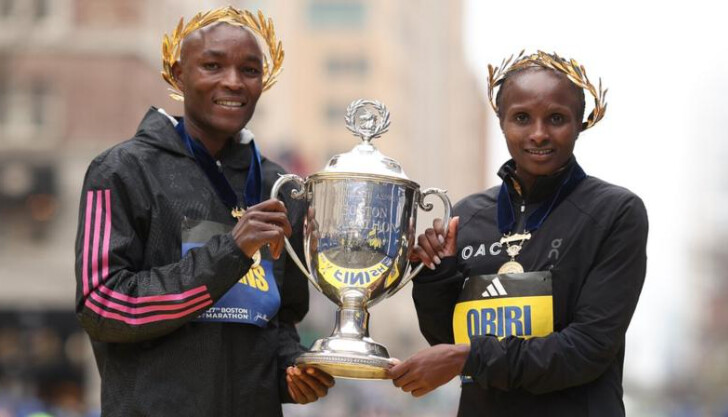
Obiri who has been named in Kenya’s marathon team for Paris Olympics is also the New York City Marathon champion.
“I am excited to return to the 2024 Boston Marathon to try to defend my title,” said Obiri, who finished last year’s race in 2:21:38.
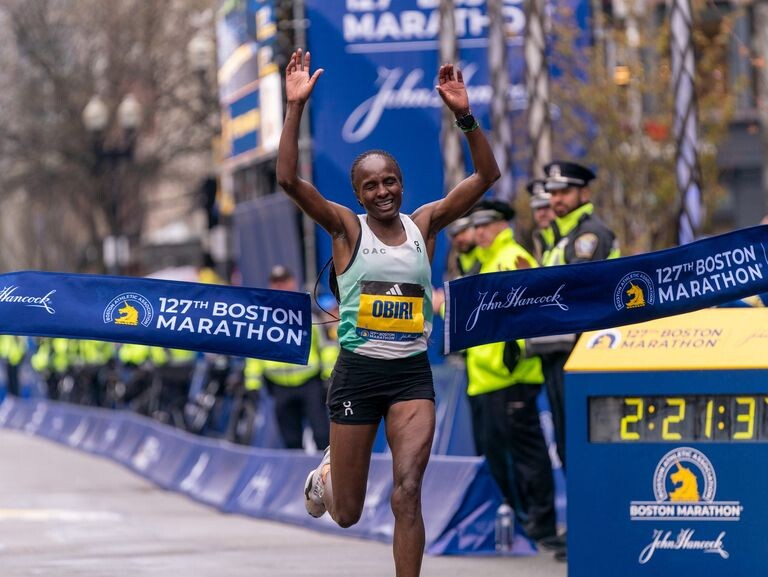
“Boston is an historic race and I would like to add my name further to its history on April 15. Winning such a historic marathon with my family waiting at the finish line was an amazing experience.”
A trifecta of Ethiopians with lifetime bests under 2:18:00 will take to the Boston course.
Worknesh Degefa, the 2019 Boston Marathon champion, returns, while 2:17:36 marathoner Tadu Teshome will make her Boston debut. Hiwot Gebremaryam aims to improve on her eighth-place finish last year.
World championships medallist Senbere Teferi who won the 2022 B.A.A. 5K in a course record of 14:49 is also in the mix.
Experienced marathoner Ababel Yeshaneh –second in 2022 and fourth in 2023— will try to become the seventh woman from Ethiopia to win the olive wreath in Boston.
Joining Obiri from Kenya are 2022 World Athletics Championships Marathon silver medalist Judith Korir, two-time Boston Marathon winner Edna Kiplagat, four-time top-ten finisher Mary Ngugi-Cooper and 2022 New York City Marathon champion Sharon Lokedi.
Helah Kiprop, who holds a silver medal in the marathon from the 2015 World Athletics Championships and has earned wins in Tokyo, Copenhagen and Paris, makes her second career Boston start. From Morocco is 2023 world marathon bronze medalist Fatima Gardadi.
Desiree Linden leads the American contingent six years after winning the title. Linden has finished in the top-five five times and holds the third-fastest time by an American ever on the Hopkinton-to-Boston route (2:22:38).
Linden will run her fifth U.S. Olympic Marathon Trials in February. Joining her is Emma Bates, who finished fifth last year in the second-fastest time ever by an American woman at Boston (2:22:10).
“At this point in my career it’s an easy decision to return to the Boston Marathon and make it my top priority race of the spring,” said Linden.
“I can’t wait to take on the iconic course for an 11th time and have the opportunity to mix it up with some of the best runners in the world.”
Jack Fleming, President and CEO of the Boston Athletic Association said: “The Boston Marathon is proud to showcase the world’s best athletes year in and year out on Patriots’ Day.”
“This year’s women’s field is exceptionally fast and showcases many who’ve been podium finishers on the global stage. It’ll make for an exciting race from Hopkinton to Boston, and we look forward to crowning our champions on April 15,” he added.
by Angwenyi Gichana
Login to leave a comment
Boston Marathon
Among the nation’s oldest athletic clubs, the B.A.A. was established in 1887, and, in 1896, more than half of the U.S. Olympic Team at the first modern games was composed of B.A.A. club members. The Olympic Games provided the inspiration for the first Boston Marathon, which culminated the B.A.A. Games on April 19, 1897. John J. McDermott emerged from a...
more...Strongest Women’s Field in the race history at Boston Marathon 2024
The 128th Boston Marathon presented by Bank of America will feature the strongest women’s field in race history, led by defending champions Hellen Obiri and Susannah Scaroni. A total of 19 women with personal bests under 2:23:00 will line up in Hopkinton aiming to earn the Open Division crown, including Olympians, Abbott World Marathon Majors winners, and national stars. In the Wheelchair and Para Athletics Divisions, Paralympic hopefuls from around the world are set to compete.
“The Boston Marathon is proud to showcase the world’s best athletes year in and year out on Patriots’ Day,” said Jack Fleming, President and CEO of the Boston Athletic Association. “This year’s women’s field is exceptionally fast and showcases many who’ve been podium finishers on the global stage. It’ll make for an exciting race from Hopkinton to Boston, and we look forward to crowning our champions on April 15.”
Women from 20 countries will be competing as part of the Bank of America Professional Athlete Team.
“Each year, the Boston Marathon sets the bar higher with an unbelievable level of athletic talent, and its impact on communities around the world,” said David Tyrie, chief digital officer and chief marketing officer, Bank of America. “The 128th Boston Marathon builds on a rich history and will continue to be an inspiration for all athletes.”
HELLEN OBIRI SET TO DEFEND OPEN DIVISION TITLE
Hellen Obiri, a two-time Olympic silver medalist from Kenya now living in Colorado, won the 2023 Boston Marathon thanks to a perfectly-timed sprint in the final mile. Adding to her trophy case, Obiri also took home the 2023 B.A.A. 10K title in June and the TCS New York City Marathon crown in November.
“I am excited to return to the 2024 Boston Marathon to try to defend my title,” said Obiri, who finished last year’s race in 2:21:38. “Boston is an historic race and I would like to add my name further to its history on April 15. Winning such an historic marathon with my family waiting at the finish line was an amazing experience.”
A trifecta of Ethiopians with lifetime bests under 2:18:00 will take to the Boston course. Worknesh Degefa, the 2019 Boston Marathon champion, returns, while 2:17:36 marathoner Tadu Teshome will make her Boston debut and Hiwot Gebremaryam aims to improve upon her eighth-place finish last year. Also from Ethiopia is World championships medalist Senbere Teferi; she won the 2022 B.A.A. 5K in a course record 14:49 and has shown talent at the longer distances. Experienced marathoner Ababel Yeshaneh –second in 2022 and fourth in 2023— will try to become the seventh woman from Ethiopia to win the olive wreath in Boston.
Joining Obiri from Kenya are 2022 World Athletics Championships Marathon silver medalist Judith Korir; two-time Boston Marathon winner Edna Kiplagat; four-time top-ten finisher Mary Ngugi-Cooper; and 2022 TCS New York City Marathon champion Sharon Lokedi. Helah Kiprop, who holds a silver medal in the marathon from the 2015 World Athletics Championships and has earned wins in Tokyo, Copenhagen, and Paris, makes her second career Boston start. From Morocco is 2023 World Athletics Championships Marathon bronze medalist Fatima Gardadi.
Desiree Linden leads the American contingent six years after winning the 2018 title. Linden has finished in the top-five five times, and holds the third fastest time by an American ever on the Hopkinton-to-Boston route (2:22:38). Linden will run her fifth U.S. Olympic Marathon Trials in February. Joining her is Emma Bates who finished fifth last year in the second-fastest time ever by an American woman at Boston (2:22:10).
“At this point in my career it’s an easy decision to return to the Boston Marathon and make it my top priority race of the spring,” said Linden. “I can’t wait to take on the iconic course for an 11th time and have the opportunity to mix it up with some of the best runners in the world.”
128TH BOSTON MARATHON PROFESSIONAL WOMEN’S FIELDS
Women’s Open Division
Country
Personal Best
Worknesh Degefa
ETH
2:15:51 (Valencia, 2023)
Tadu Teshome
ETH
2:17:36 (Valencia, 2022)
Hiwot Gebremaryam
ETH
2:17:59 (Valencia, 2023)
Judith Korir
KEN
2:18:20 (Eugene, 2022)
Meseret Belete
ETH
2:18:21 (Amsterdam, 2023)
Tiruye Mesfin
ETH
2:18:47 (Valencia, 2022)
Worknesh Edesa
ETH
2:18:51 (Berlin, 2022)
Zeineba Yimer
ETH
2:19:07 (Berlin 2023)
Senbere Teferi
ETH
2:19:21 (Berlin, 2023)
Dera Dida
ETH
2:19:24 (Berlin, 2023)
Edna Kiplagat
KEN
2:19:50 (London, 2012)*
Mary Ngugi-Cooper
KEN
2:20:22 (London, 2022)
Nazret Weldu Gebrehiwet
ERI
2:20:29 (Eugene) NR
Ababel Yeshaneh
ETH
2:20:51 (Chicago, 2019)
Vibian Chepkirui
KEN
2:20:59 (Vienna, 2022)
Helah Kiprop
KEN
2:21:27 (Tokyo, 2016)
Hellen Obiri
KEN
2:21:38 (Boston, 2023)
Emma Bates
USA
2:22:10 (Boston, 2023)
Desiree Linden
USA
2:22:38 (Boston, 2011)*
Buze Diriba
ETH
2:23:11 (Toronto, 2023)
Sharon Lokedi
KEN
2:23:23 (New York City, 2022)
Malindi Elmore
CAN
2:23:30 (Berlin, 2023)*
Fatima Gardadi
MOR
2:24:12 (Xiamen, 2024)
Angie Orjuela
COL
2:25:35 (Berlin, 2023) NR
Fabienne Konigstein
GER
2:25:48 (Hamburg, 2023)
Jackie Gaughan
USA
2:27:08 (Berlin, 2023)
Dominique Scott
RSA
2:27:31 (Chicago, 2023)
Grace Kahura
KEN
2:29:00 (Sacramento, 2023)
Katie Kellner
USA
2:32:48 (Berlin, 2023)
Briana Boehmer
USA
2:33:20 (Sacramento, 2021)
Dylan Hassett
IRL
2:33:25 (Pulford, 2021)
Parley Hannan
USA
2:33:43 (Carmel, 2023)
Sara Lopez
USA
2:33:48 (Eugene, 2023)
Annie Heffernan
USA
2:34:33 (Lowell, 2023)
Nera Jareb
AUS
2:35:00 (Queensland, 2022)*
Johanna Backlund
SWE
2:35:10 (Hamburg, 2019)
Argentina Valdepenas Cerna
MEX
2:35:34 (Chicago, 2022)*
Ariane Hendrix Roach
USA
2:35:39 (Sacramento, 2022)
Michelle Krezonoski
CAN
2:36:39 (Sacramento, 2022)
Shannon Smith
USA
2:36:43 (Columbus, 2023)
Caroline Williams
USA
2:37:01 (Sacramento, 2022)
Gina Rouse
USA
2:37:10 (Sacramento, 2023)*
Kim Krezonoski
CAN
2:37:20 (Sacramento, 2022)
Abigail Corrigan
USA
2:37:45 (Sacramento, 2023)
Marissa Lenger
USA
2:38:41 (Chicago, 2022)
Emilee Risteen
USA
2:38:46 (Duluth, 2023)
Isabelle Pickett
AUS
2:38:46 (Valencia, 2023)
Allie Hackett
USA
2:38:52 (Duluth, 2023
Mary Christensen
USA
2:38:55 (Big Bear, 2023)
Olivia Anger
USA
2:39:13 (Indianapolis, 2023)
April Lund
USA
2:39:23 (Houston, 2022)*
Sarah Short
AUS
2:39:51 (Valencia, 2023)
Maura Lemon
USA
2:40:30 (Valley Cottage, 2023)
Sarah Sibert
USA
2:40:31 (Philadelphia, 2022)
Lauren Ames
USA
2:40:34 (Valley Cottage, 2023)
Kassie Harmon
USA
2:41:48 (Utah Valley, 2023)*
Elizabeth Camy
USA
2:42:51 (Sacramento, 2022)*
Alexandra Niles
USA
2:43:23 (Hartford, 2022)*
Amber Morrison
USA
2:43:50 (Sacramento, 2022)*
Mindy Mammen
USA
2:44:01 (Duluth, 2023)*
Ziyang Liu
USA
2:44:56 (Eugene, 2023)*
*Denotes Masters Division (40+)
Login to leave a comment
Boston Marathon
Among the nation’s oldest athletic clubs, the B.A.A. was established in 1887, and, in 1896, more than half of the U.S. Olympic Team at the first modern games was composed of B.A.A. club members. The Olympic Games provided the inspiration for the first Boston Marathon, which culminated the B.A.A. Games on April 19, 1897. John J. McDermott emerged from a...
more...Defending Champions, American Record Holders & Global Stars Highlight 2023 B.A.A. Half Marathon Professional Field
The Boston Athletic Association (B.A.A.) announced today a star-studded professional field for the 2023 B.A.A. Half Marathon presented by Dana-Farber Cancer Institute and the Jimmy Fund. Defending champions Viola Chepngeno, Geoffrey Koech, and Jenna Fesemyer all return, while American half marathon record holder Keira D’Amato will take on the challenging course for the first time on Sunday, November 12. The B.A.A. Half Marathon starts and finishes at Franklin Park and runs along the Emerald Necklace Park System.
“As one of the most competitive half marathons in the country, we’re eager to bring many of the best open, wheelchair, and Para athletes in the world to Boston for November’s B.A.A. Half Marathon presented by Dana-Farber Cancer Institute and the Jimmy Fund,” said Jack Fleming, President and CEO of the B.A.A. “Nearly 9,000 athletes will take to the roads, led by some of the fastest and most decorated competitors in event history.”
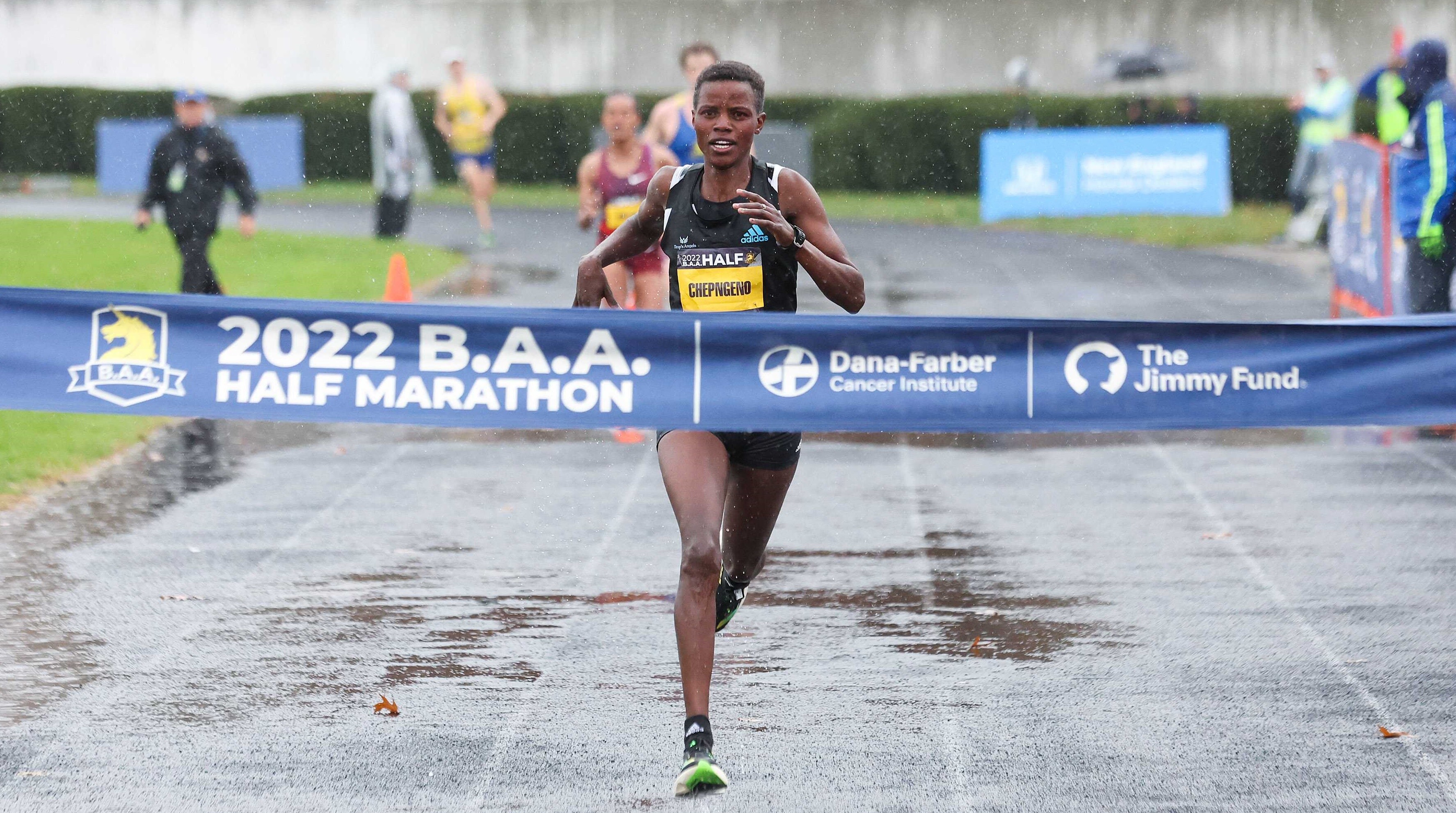
In 2022, Chepngeno (Kenya), Koech (Kenya), and Fesemyer (USA) won the women’s open, men’s open, and women’s wheelchair divisions, respectively, while Marko Cheseto and Jacky Hunt-Broersma (both USA) persevered through rain to finish atop the podium in the Para Athletics Division. To repeat the feat, all will square off against a field that includes national record holders and global medalists.
Senbere Teferi of Ethiopia, the 2022 B.A.A. 5K champion and three-time world championships medalist, looks to continue her winning ways in Boston. She’ll battle Tokyo Marathon champion Rosemary Wanjiru, 2019 B.A.A. 10K winner Fancy Chamutai, world cross country silver medalist Tsigie Gebreselama, last year’s runner-up Bosena Mulatie, and two-time B.A.A. Half Marathon second place finisher Cynthia Limo.
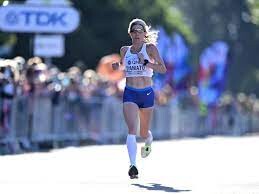
Four Americans who competed at the World Athletics Championships in Budapest in August will toe the line, including D’Amato, Lindsay Flanagan, Susanna Sullivan, and Natosha Rodgers. D’Amato set the national half marathon record of 1:06:39 at this year’s Gold Coast Half Marathon in Australia, and along with Flanagan and Sullivan made up Team USA at the World Championships Marathon. Rodgers raced the 5,000m and 10,000m on the track in Budapest, finishing 14th in the latter event. Rachel Schneider Smith, a 2021 Olympian at 5,000m for Team USA, will be making her B.A.A. Half Marathon debut.
Ten men with sub-61 minute personal bests will line up for the B.A.A. Half Marathon. Abel Kipchumba owns the fastest lifetime best in the field (58:07), while Shadrack Kimining of Kenya, second fastest in the field, placed fifth in 2022. Mohamed El Aaraby (Morocco), Yemane Haileselassie (Eritrea), Pat Tiernan (Australia), and Amanuel Mesel (Eritrea) bring international expertise. The fastest American men’s entrants are Nadir Yusuf (1:03:23), Kevin Koski (1:03:35) and Ryan Cutter (1:03:54) and sub-2:10 marathoner Ian Butler.
Dedham, Mass.-native Brian Reynolds, who set a world record at last year’s B.A.A. Half Marathon in the T62 (lower-limb impairment) category, returns, as does Marko Cheseto (T62) who ran 1:24:54 in 2022. Jacky Hunt-Broersma, last year’s women’s T62 champion, and Liz Willis, a three-time Boston Marathon T62 winner, will compete as well.
In the wheelchair division, Fesemyer set a course record 59:50 in 2022 to become the first women’s wheelchair athlete ever to break one hour in race history. Fellow 2022 women’s wheelchair podium finishers Yen Hoang (second place) and Michelle Wheeler (third) return as well.
James Senbeta and Hermin Garic, veterans of many B.A.A. events, headline the men’s wheelchair field. Garic was victorious at this year’s B.A.A. 10K.
The B.A.A. Half Marathon course runs along the picturesque Emerald Necklace Park System, past landmarks such as the Arnold Arboretum, Jamaica Pond, and Franklin Park Zoo, before finishing at White Stadium in Franklin Park. The B.A.A. Half Marathon is a family-friendly event for athletes and spectators of all ages. Free youth events will be offered on race morning within Franklin Park, including races and medals for all.
Dana-Farber Cancer Institute and the Jimmy Fund has partnered with the B.A.A. Half Marathon since 2003 as the race’s presenting sponsor and exclusive charity team. Through this relationship, Dana-Farber runners have collectively raised more than $8 million to support groundbreaking cancer research, and enabled Dana-Farber scientists and clinicians to positively impact the lives of cancer patients around the world. In advance of the 2023 event, 640 Team Dana-Farber athletes have raised $375,000 to date.
Login to leave a comment
B.A.A. Half Marathon
Dana-Farber and the Jimmy Fund have partnered with the B.A.A. in the Half Marathon for 13 years as the race’s presenting sponsor. Through this relationship, team members have collectively raised more than $5 million to support groundbreaking cancer research, and enabled Dana-Farber scientists and clinicians to positively impact the lives of cancer patients around the world. Dana-Farber runners often participate...
more...Boston Marathon has a cutoff once again, runners had to run 5:29 faster than the qualifying time for their age and gender to gain entry into the 2024 race
The Boston Athletic Association (B.A.A.) announced on September 28 that the cutoff for the 2024 Boston Marathon is 5:29.
In other words, it wasn’t enough for applicants to run a qualifying time for their age group and gender. They had to be significantly faster than their time standard.
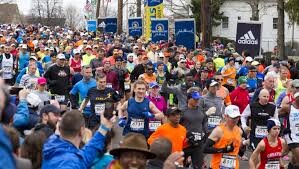
According to race officials, 11,039 runners who qualified were unable to be let into the race.
This reverses the trend from the past two years, coming out of the pandemic, when there was no cutoff time. Everyone with a valid qualifying time who applied for the 2022 and 2023 races got in.
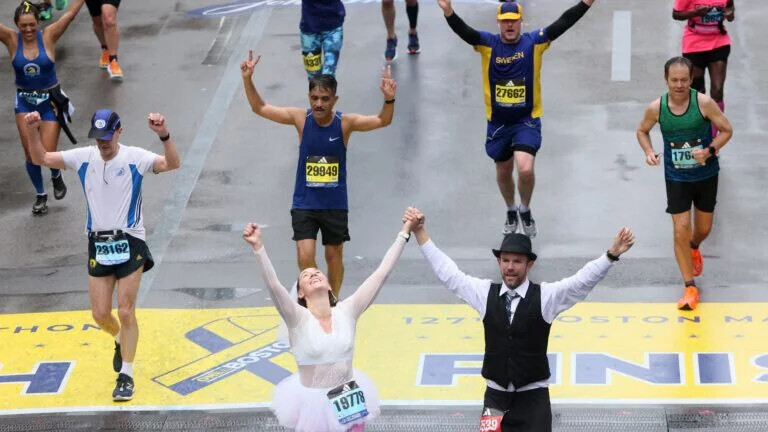
The 2021 race, which was held in October that year, had a cutoff of 7:47, because the field size was much smaller—only 20,000 runners—coming out of COVID. The 2020 edition of the Boston Marathon was canceled.
The B.A.A. announced on September 15 that for the 2024 race, there had been 33,000 applicants during the one-week registration period, a record. The field size is set at 30,000 and about 73 percent of those—this year, 22,019 runners—are time qualifiers. The other 8,000 entrants run for charities or receive invitational entries.
The previous record for applications was 30,458 in 2018 for the 2019 race. That number of applicants resulted in a cutoff of 4:52. Also in 2018, the race tightened the qualifying times by five minutes across every age group.
“Just four years after we adjusted the race’s qualifying standards by 5 minutes for all ages and divisions, more than 33,000 athletes earned Boston Marathon qualifying times,” said Jack Fleming, the B.A.A.’s president and CEO, in a written statement. “While we’re unable to accept all into the field, we applaud and recognize the many athletes who circled the 128th Boston Marathon on their calendar as a goal race to strive towards.”
The B.A.A.’s early announcement of the record number of applicants helped some Boston hopefuls brace for the news they wouldn’t gain entry into the race. Across social media, runners prepped for disappointment.
Robert Wang, founder of the World Marathon Majors Challenge Facebook group, which closely tracks the ins and outs of getting into various races, said he was hoping to establish a streak of 10 consecutive years of running Boston, after which he would no longer have to worry about the cutoff time; qualifying would give him automatic entry. (He was up to four.) He had already booked refundable hotel rooms in Boston for April 2024.
He was shocked to see the B.A.A.’s announcement of the number of applicants on the evening after registration closed. “It was the first time in recent memory the B.AA has released an estimate of the number of applicants with the close of registration,” said Wang, 50, of Canton, Ohio. “I knew immediately that I was not getting in with my 2:54 with 33,000 applicants.”
Road racing appears to be emerging from a slump that began during the pandemic, when most events were canceled, and extended through 2021, even as races returned to the calendar. Now many races are seeing registration numbers that match or exceed their pre-pandemic totals.
The qualifying period for the 2024 marathon ran from September 1, 2022, through the last day of registration, September 15, 2023.
by Sarah Lorge
Login to leave a comment
Boston Marathon
Among the nation’s oldest athletic clubs, the B.A.A. was established in 1887, and, in 1896, more than half of the U.S. Olympic Team at the first modern games was composed of B.A.A. club members. The Olympic Games provided the inspiration for the first Boston Marathon, which culminated the B.A.A. Games on April 19, 1897. John J. McDermott emerged from a...
more...Record-breaking registration numbers reported for 2024 Boston Marathon
The 128th Boston Marathon presented by Bank of America has set a remarkable record as it closed its qualifier registration window on Friday, Sept. 15. An astounding 33,000 applications were received by the Boston Athletic Association (B.A.A.) surpassing the previous record of 30,458 entries in 2019.
The applications for the 2024 Boston Marathon came from runners from 127 different countries and all 50 U.S. states, along with Washington, D.C. Qualifying athletes earned their spots in more than 528 races worldwide, showcasing the event’s international appeal. Impressively, applicants ranged in age from 18 to 82, underlining the race’s inclusivity and ability to inspire athletes of all ages.
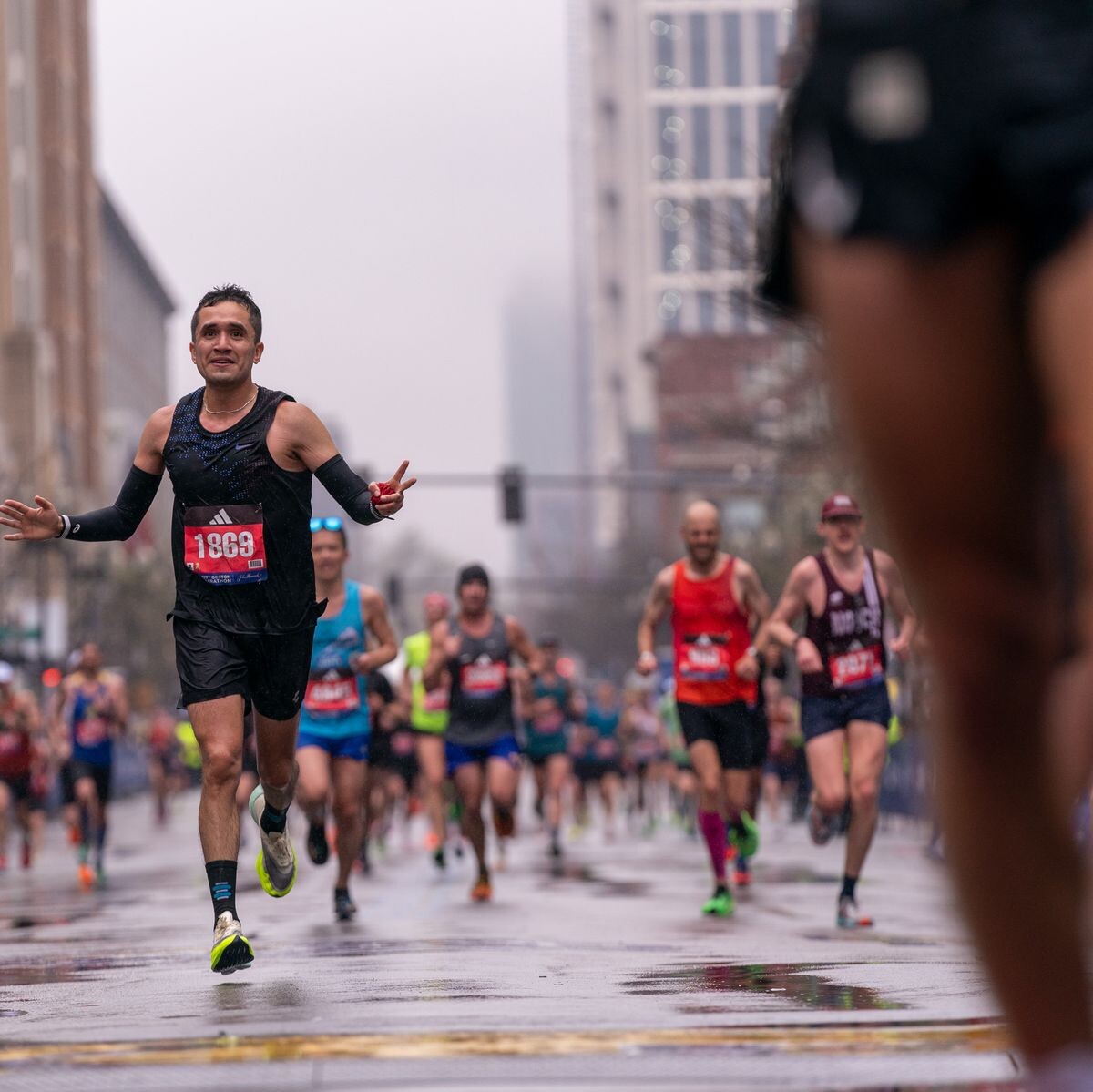
Despite the surge in applications, not all qualifiers will secure a spot in the 128th Boston Marathon. The B.A.A. is currently verifying all qualifying times and will notify applicants of their acceptance or non-acceptance within the next three weeks.
To maintain transparency, the organization has not speculated on a “cut-off” time for entry and requests athletes’ understanding and patience during this verification process.
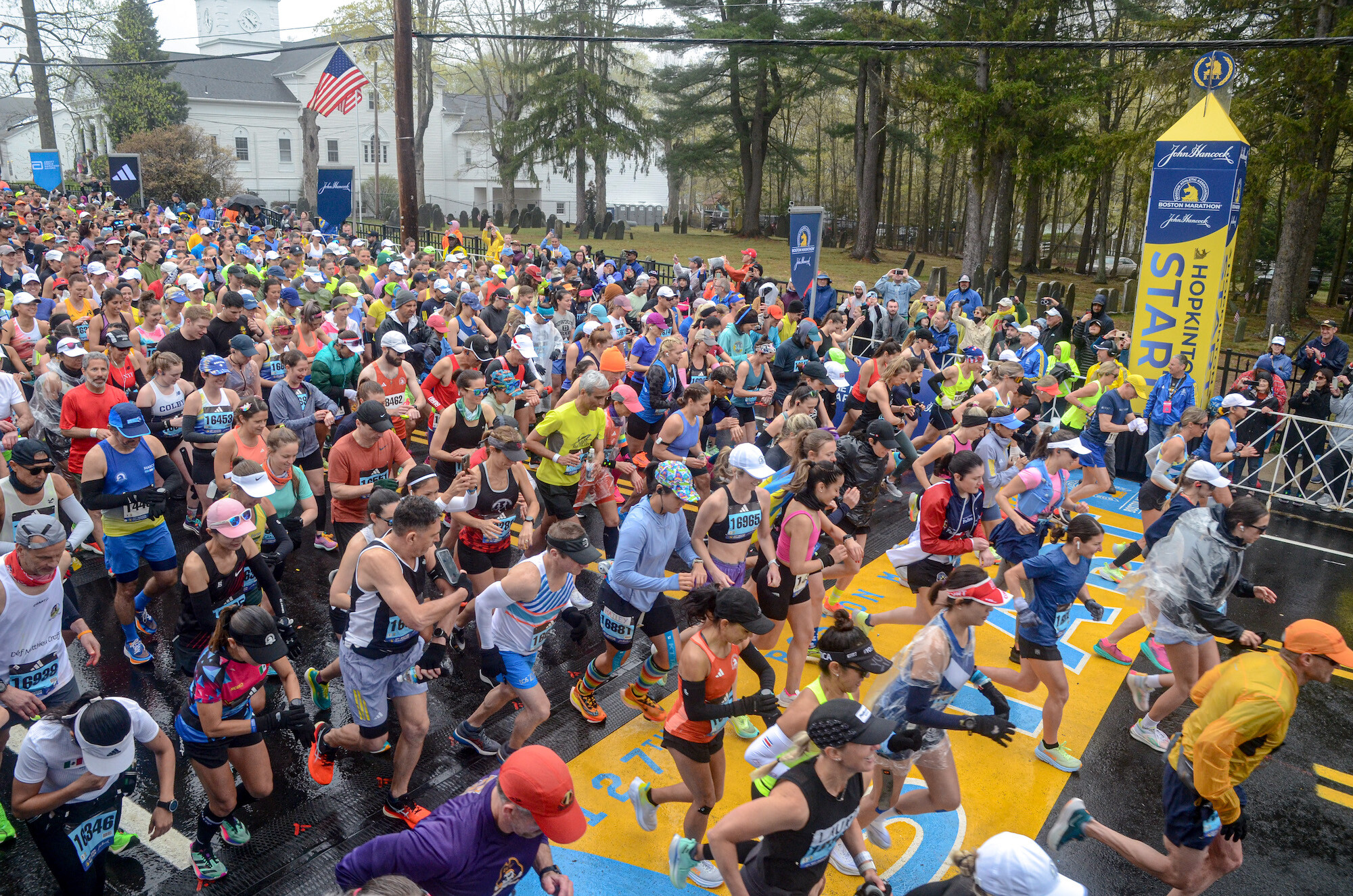
Jack Fleming, President and CEO of the B.A.A. commended the global running community’s passion and commitment to participating in the iconic race. Fleming stated, “Receiving a record number of applications is a testament to the strength of road racing around the world and speaks to runners’ commitment to taking on the challenge of earning a Boston Marathon qualifying time with the goal of reaching the start line in Hopkinton.”
For individuals who do not make the cut or lack a Boston Marathon qualifying time, there’s still an opportunity to participate through the Bank of America Boston Marathon Official Charity Program. This program includes 160 non-profit and charitable organizations that have begun accepting applicants for the upcoming event.
Login to leave a comment
Boston Marathon
Among the nation’s oldest athletic clubs, the B.A.A. was established in 1887, and, in 1896, more than half of the U.S. Olympic Team at the first modern games was composed of B.A.A. club members. The Olympic Games provided the inspiration for the first Boston Marathon, which culminated the B.A.A. Games on April 19, 1897. John J. McDermott emerged from a...
more...B.A.A. Announces Expanded Para Athletics Divisions and Enhanced Prize Money Awards for 2024 Events
The Boston Athletic Association (B.A.A.) today announced plans for an enhanced prize money structure across B.A.A. events in 2024, as well as the introduction of two new Para Athletics Divisions for athletes competing with coordination impairments (T35-T38) and intellectual impairments (T20) as well as more inclusive upper and lower limb impairment divisions. The changes will provide greater financial rewards for athletes across multiple divisions and expanded opportunities for athletes within the Para Athletics Divisions and Wheelchair Divisions.
“We are always looking at ways to celebrate and reward athletic excellence,” said Jack Fleming, B.A.A. President and CEO. “With these changes, we are recognizing top finishers and aspiring athletes in our Wheelchair and Para Athletics Divisions, while also expanding opportunities for new groups of athletes to be recognized and included in our B.A.A. events.”
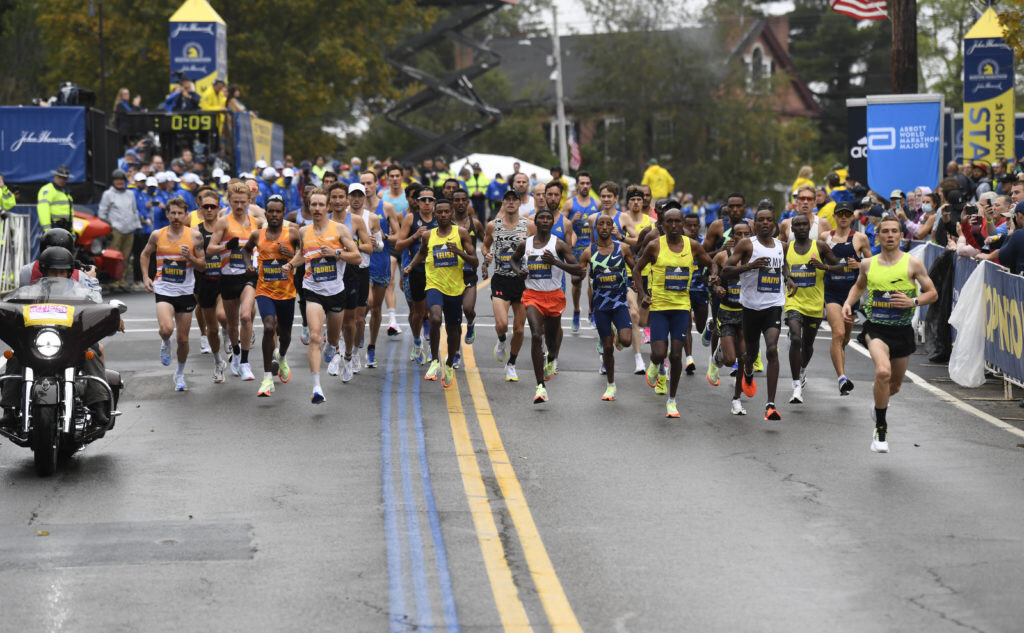
He continued, “Boston is a running city, and we’ve made it our goal to elevate Para athletes as they train and compete for the podium at our events, from the 5K through to the marathon.”
“This creates an enormous positive impact for Para athletes and shows how the B.A.A. is leading the way towards greater inclusivity in sports,” said John Jordan, head of The Academy and executive co-sponsor of the Disability Action Network, Bank of America. “As we look across our involvement in sports around the world, we’re committed to help broaden the possibilities available to athletes competing at all levels.”
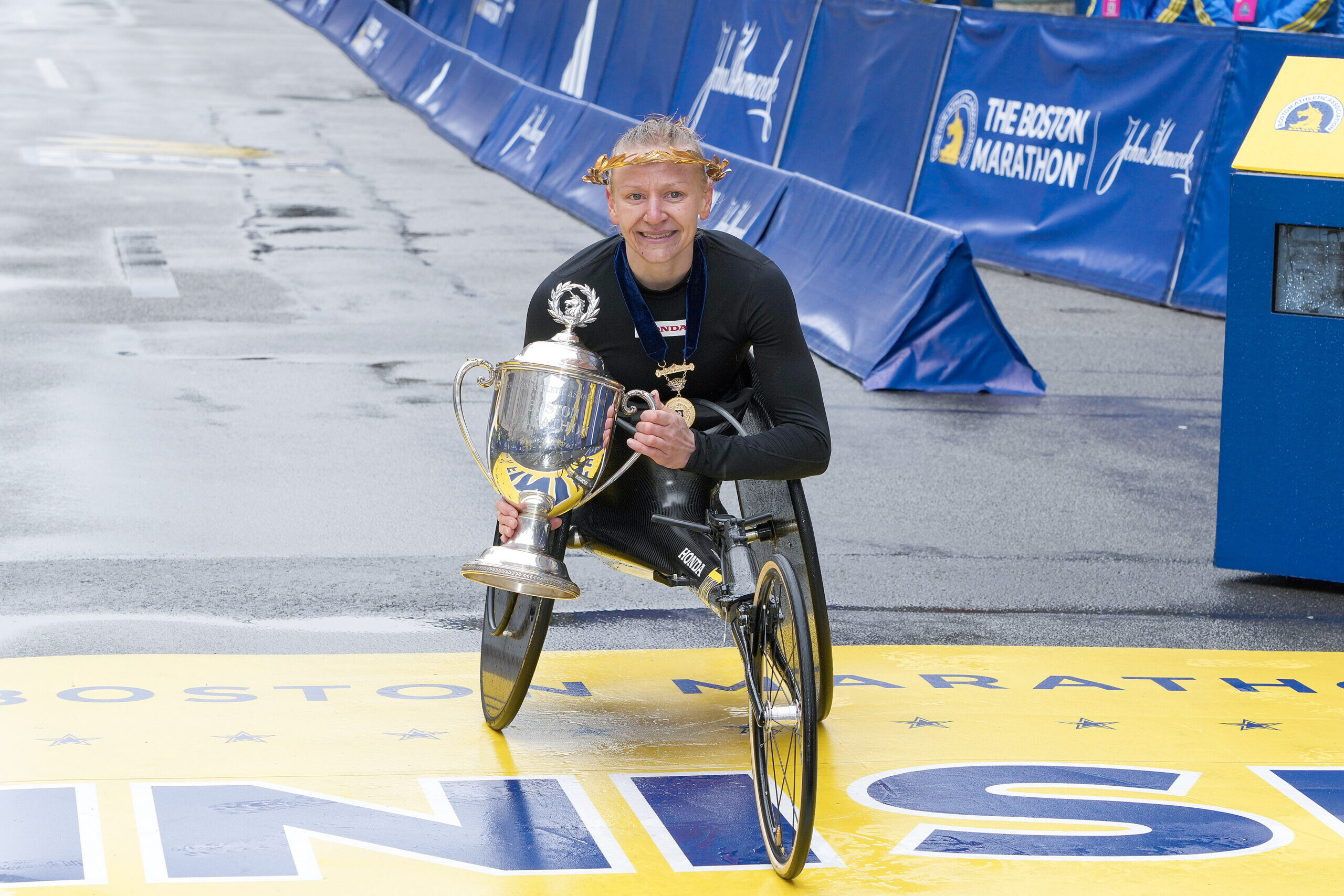
New prize structures highlights:
The Boston Marathon presented by Bank of America will now feature a cumulative prize fund of more than $1 million.
Wheelchair champions [T53/54/34] at the Boston Marathon presented by Bank of America will now receive a first-place prize of $40,000 (increased from $25,000), and places 2-10 will also receive increases in awards compared to recent years. Wheelchair athletes with T51-T52 classifications will receive awards for places 1-3.
The total wheelchair prize for 2024 will be $313,500 for men and women (previously $125,000). This includes $50,000 each for a course record (equal to the Open course record award)
The top three finishers in all seven Para Athletics Divisions at the Marathon will receive prize money of $2,500; $1,500; $1,000, respectively.
Additional increases in the Wheelchair Division and Para Athletic Division prize money will be offered for the B.A.A. 5K, B.A.A. 10K, and B.A.A. Half Marathon. The B.A.A. Half Marathon will also feature increased open division prize money for podium finishers.
Para and Wheelchair prize money divisions at the Boston Marathon adhere to World Athletics and World Para Athletics rules of competition. Athletes competing in the Para and Wheelchair divisions must be nationally or internationally classified to be eligible.
Overview of new Para Athletic divisions:
Seven Para Athletics Divisions will now be offered at the Boston Marathon presented by Bank of America, with newly established divisions for athletes with coordination impairments [T35-T38 and intellectual impairments [T20].
Additionally, the T61/63 lower limb impairment will now add the T43 classification, and the T62/64 lower limb impairment division will now add T42/T44 classifications.
The seven divisions are an increase from five divisions offered in 2023 (vision [T11/T12, T13], upper-limb [T45/T46], and lower-limb impairments [T61/T63, T62/T64]).
A Para Athletics Division for athletes with coordination impairments will be offered at the B.A.A. Half Marathon, B.A.A. 10K, and B.A.A. 5K from 2024. Each of these events will now feature four Para Athletics Divisions namely vision, upper-limb, lower-limb, and coordination impairments.
Athlete Quotes
Marko Cheseto - Kenyan All-American athlete who holds the world record for a double lower leg amputee in the marathon said, “This increased recognition [from the B.A.A.] gives athletes with disabilities more public attention, and we can perform at a higher level given these opportunities.
“Now that we have the world’s oldest marathon leading the way [with prize money for Para divisions] all other marathons should be inclusive. It's about diversifying the sport and creating more avenues for people with disabilities to compete, so we continue to grow the sport for future generations.”
Daniel Romanchuk, US Paralympian and two-time Boston Marathon winner said, “The B.A.A. has championed the wheelchair division for many decades and continues to build on that tradition by including more Para-athlete divisions, allowing an ever-increasing number of athletes to compete.
“Increased prize money makes it possible for emerging athletes to attend elite-level races as well as helping them afford the costly equipment and repairs that are necessary to compete in Para-athletics. The B.A.A. is continually finding ways to elevate the sport, and it's incredibly exciting to imagine the future of Para-athletics!”
Reigning Boston Marathon Champion, and multi-World and Paralympic Champion from Switzerland, Marcel Hug said, “To see how the sport of wheelchair racing has developed in recent years is very gratifying and it is also a credit to the Boston Athletic Association. It is not only about the financial support which enables us to train and compete at a higher level, but it is also about the increased recognition and inclusion of Para-sports.
“As top athletes we try to perform at our best and inspire other people with or without disabilities so the support of the B.A.A. and the entire Abbott World Marathon Major series is more than just rewarding top performing athletes, it shows that we are an equal part of society.”
Tatyana McFadden, 21-time Abbott World Marathon Major winner from America said,“I’m proud to see how far we have come. I’m thankful for past, and for current athletes who have raised their voices to help create change. Change takes more than just one person, it takes a village, and takes people who believe in us. The B.A.A. has been part of that, so I am very thankful.
“The prize money is so important to support the elite Para divisions. The more support, visibility and education we can bring to the sport, the better it can be for all the athletes.”
Susannah Scaroni, Paralympic Gold medalist and the 2023 Boston Marathon Champion from America said, “The legacy of the Boston Marathon and its support of the wheelchair division has impacted me in so many ways.
“As a person with a disability, the legacy of the original 1970 wheelchair athletes has enabled myself and all other Para-athletes of my generation to perceive ourselves and to be perceived publicly, as professional athletes. I cannot express how much this has meant for all of us.
“The provision of prize money indicated that the B.A.A. truly recognized that wheelchair racers are elite athletes, and this support has enabled the sport to grow and improve and subsequently gives more people with disabilities exposure to role models.”
Liz Willis, Paralympian and three-time Boston Marathon Para Champion said, “The support of the B.A.A. for Para divisions is vital to expanding the Para movement. Just as the Boston Marathon was the first Abbott World Marathon Major to open the doors of possibility for women, they are doing the same for amputees and visually impaired athletes.
"It takes time and recognition to build a program, and the B.A.A. is the ONLY reason I currently run marathons. The Boston Marathon allows others to see their impossible become possible. It has forever impacted my life by breaking down the walls of discrimination and providing pathways for all to push their limits of what's possible.”
by B.A.A. Communications Department
Login to leave a comment
B.A.A. Half Marathon
Dana-Farber and the Jimmy Fund have partnered with the B.A.A. in the Half Marathon for 13 years as the race’s presenting sponsor. Through this relationship, team members have collectively raised more than $5 million to support groundbreaking cancer research, and enabled Dana-Farber scientists and clinicians to positively impact the lives of cancer patients around the world. Dana-Farber runners often participate...
more...Now nonbinary runners can compete at Boston Marathon
For nonbinary runners, this year’s Boston Marathon isn’t just a running event. It’s a major milestone in the race for inclusion.
The 2023 race will include a nonbinary division for the first time in the marathon’s storied 127-year history. While other major marathons, including New York City and Chicago, also have nonbinary divisions, Boston remains one of the most prestigious events on the marathon calendar.
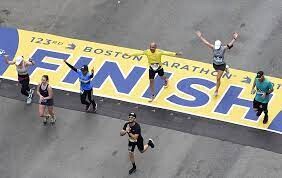
It’s considered a bucket-list marathon because the race requires most runners, including those in the new nonbinary division, to earn their way onto the course by meeting strict qualifying time standards.
“Hopefully this has ripples across the country and across the world — in the running world to begin and then hopefully beyond the running world,” said Cal Calamia, a 26-year-old inclusivity activist from San Francisco who will be one of 27 runners competing in the nonbinary division at Boston on April 17.
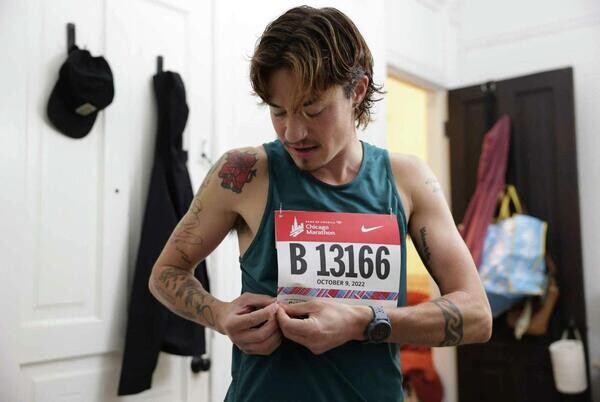
The London Marathon will also debut a nonbinary division at its race this year on April 23.
Setting nonbinary qualifying times
Calamia, who identifies as nonbinary transmasculine, had qualified to run the 2021 Boston Marathon in the women’s division but then tore their ACL playing soccer. The first thought that went through Calamia’s head was anguish at not being able to run Boston. But the delay offered a silver lining.
“I like to look back on it and just think I’m actually really grateful that things happened the way they did,” Calamia said. “Because I was gonna go in there as a nonbinary person in the female category, and it didn’t feel right.”
Now, Calamia says they don’t have to choose between running Boston and their gender identity. “I don’t have to deal with essentially choosing between two things that aren’t really true and trying to pretend that one of them fits when it doesn’t,” they said.
Calamia has run the Chicago Marathon, California International Marathon and San Francisco Marathon. Their personal best is 2:58:50 from last year’s Chicago Marathon. But to Calamia, Boston is special.
“When I started thinking about running marathons, I was thinking about Boston,” they said.
A big reason for the race’s mythical status is its strict qualifying standards. Qualifying times are now broken down by age groups, and qualifying for Boston — or “BQ” in running vernacular — has become a badge of honor for amateur runners around the world.
One of the challenges of adding a nonbinary division was figuring out the qualifying standards. Race organizers decided that the nonbinary time standards for this year would match those for the women’s division, said Jack Fleming, the chief executive and president of the Boston Athletic Association, which hosts the Boston Marathon.
This year, runners in the women’s and nonbinary divisions ages 18 to 34 needed to run a marathon at 3:30 or faster to qualify. The men in that age range were required to run three hours or faster.
“We landed on having the nonbinary qualifications match the female qualifications, because it was the most inclusive,” said Susie Cleary, the BAA director of athlete services.
The BAA said on its website that the organization does not yet have enough data to establish nonbinary qualifying times and that this first year will be used as an “opportunity to learn and grow together.”
Jake Fedorowski, a 27-year-old from Seattle who wrote a guide for nonbinary inclusion in running, called the decision a “good move.” “You’re doing this to start to collect data so that over time you can start to really tailor what those times need to be,” they said.
Awards but no prize money
Along with Calamia, Fedorowski will run in the nonbinary division. Both will be among the 30,000 runners competing at Boston this year. Of the 27 runners in the nonbinary division, 25 qualified through time standards, Cleary said. Two nonbinary runners applied through the marathon’s charity program, which waives time restrictions in exchange for raising at least $5,000 for a designated charity.
But unlike participants in other divisions, nonbinary runners will not receive prize money. The top three runners in the nonbinary division will be awarded trophies, similar to runners who place top three in their age groups. The winner in the nonbinary division at the NYC Marathon last year took home $5,000, while the Chicago Marathon did not give prize money for the nonbinary division.
The BAA didn’t explain why the nonbinary division won’t include prize money this year. “We will continue to listen to our participants, review our events and continue to strive for the best experience possible for all our athletes,” Fleming, the BAA chief executive, said in a statement.
The first-place finishers in the open division will receive $150,000, winners of the wheelchair division get $25,000, masters division winners get $5,000 and winners of the para divisions, for athletes with disabilities, get $1,500, according to the marathon website.
Login to leave a comment
Boston Marathon
Among the nation’s oldest athletic clubs, the B.A.A. was established in 1887, and, in 1896, more than half of the U.S. Olympic Team at the first modern games was composed of B.A.A. club members. The Olympic Games provided the inspiration for the first Boston Marathon, which culminated the B.A.A. Games on April 19, 1897. John J. McDermott emerged from a...
more...Starting in 2024 the Boston Marathon will have a new primary sponsor for the first time since 1985
Following a months-long search, the Boston Athletic Association announced Monday that Bank of America will become the new presenting sponsor of the historic annual race. The announcement launches a decade-long agreement between the B.A.A. and the major bank.
"We are super excited for the city of Boston, for our sport of running to be partnering with Bank of America beginning in 2024, for not only the Boston Marathon, but everything that the Boston Athletic Association does," said Jack Fleming, President and CEO of the B.A.A.
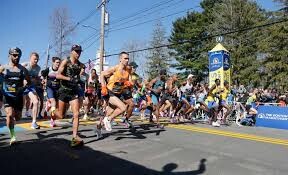
Bank of America will replace John Hancock, which is sponsoring the Boston Marathon for the last time on April 17.
"When we saw that John Hancock was going to move on -- and they've been an incredible partner for the B.A.A. -- we jumped at the opportunity," said Miceal Chamberlain, Bank of America's president for Massachusetts and national regional executive for global commercial banking. "From our CEO, Brian Moynihan, on down, we said this is one of those once-in-a-lifetime (opportunities) to partner and align with an organization that has similar values and purposes and wants to do well in the community."
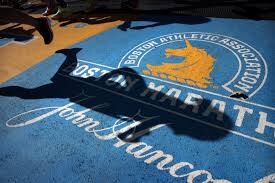
The bank is also the title sponsor of the Bank of America Chicago Marathon but unlike that arrangement, the bank and B.A.A. agreed to put the sponsorship after the name of the race. Accordingly, starting in 2024, the full title of the event will be "The Boston Marathon presented by Bank of America."
"We want to be there to help shine a brighter light on it. Give it more attention. Our branding, our marketing, we think, can help amplify the message that they've been delivering for over 100 years now," said Chamberlain.
In addition to the sponsorship of the marathon, Bank of America and the B.A.A. said they will work together to grow the Boston Marathon's non-profit, engagement and philanthropic initiatives.
"Bank of America saw the Boston Marathon as something special, something different. And Bank of America saw that we can achieve what we are seeking to do together with the way we are positioned," said Fleming.
As the new and exclusive local broadcast partner of the Boston Marathon, WCVB Channel 5 will broadcast the race live on Monday, April 17, with the national simulcast airing on ESPN.
Login to leave a comment
Boston Marathon
Among the nation’s oldest athletic clubs, the B.A.A. was established in 1887, and, in 1896, more than half of the U.S. Olympic Team at the first modern games was composed of B.A.A. club members. The Olympic Games provided the inspiration for the first Boston Marathon, which culminated the B.A.A. Games on April 19, 1897. John J. McDermott emerged from a...
more...B.A.A. announces pregnancy deferral accommodations for all B.A.A. events, including Boston Marathon
The Boston Athletic Association (B.A.A.) announced today accommodation enhancements pertaining to runners who are expecting or have recently welcomed a child into their families. Pregnancy and postpartum deferrals of entries will now be available for registered participants at all B.A.A. events, including the Boston Marathon (April), B.A.A. 5K (April), B.A.A. 10K (June), and B.A.A. Half Marathon (November).
“In listening to our participants and stakeholders, the desire from mothers and expecting mothers to participate in our races –particularly the Boston Marathon—while also focusing on building a family was clear,” said Jack Fleming, President and Chief Executive Officer of the B.A.A. “Women who are entered in a B.A.A. race and want to expand their family will be able to do just that without giving up a chance to participate at a future B.A.A. event.”
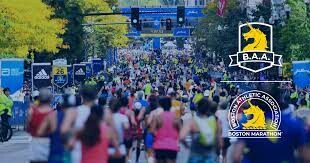
Any athlete who is a registered entrant in a B.A.A. event and is or becomes pregnant prior to race day and chooses not to participate due to such circumstances will be eligible to receive a deferred entry into one of the next two subsequent future races. The new pregnancy and postpartum deferment policy is effective immediately, and includes athletes who are entered in the Boston Marathon by way of qualifying time or invitational entry.
Athletes seeking a pregnancy or postpartum deferral may submit a request in writing to registration@baa.org any time between receiving confirmation of acceptance into the event and up to 14 days before race day. Upon receipt of a pregnancy or postpartum deferment request, the B.A.A.’s Athlete Services team will be in contact with the athlete and will request confirmation of pregnancy from a physician, registered midwife, or other medical professional.
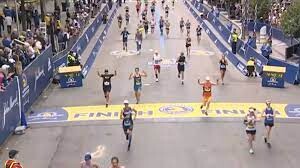
“We at the B.A.A. are always looking for ways to improve the participant experience starting at the point of registration, and have been collaborating to create this policy for many months,” said Susie Cleary, the B.A.A.’s Director of Athlete Services. “This new deferral accommodation has been implemented with the goal of supporting mother runners along their journey at all our events, from the 5K distance through the marathon.”
If an athlete becomes pregnant again during a pregnancy or postpartum deferral period, they may request a second consecutive pregnancy or postpartum deferral. This would permit the athlete to defer their race entry for a subsequent two-year period. The B.A.A. will allow up to two consecutive pregnancy deferral requests per athlete. Policy details will be posted on www.baa.org soon.
The pregnancy deferral opportunity is an accommodation in addition to the registration insurance currently offered to Boston Marathon participants, which covers refunds for a variety of situations, including pregnancy. All other rules and requirements for race entry after a pregnancy or postpartum deferral will apply, including payment for future registration entry fees.
In addition to deferrals, the B.A.A. will be enhancing accommodations for recent mothers on race weekend. For more than a decade, mothers have been provided the opportunity to utilize designated tents at the start and finish of the Boston Marathon for lactation pumping. In response to the overwhelming support of this program and the accompanying medical device transport program (where race officials transport devices such as breast pumps from the start to finish), the B.A.A. plans to share additional accommodations as race day approaches. The B.A.A. is currently consulting a group of mother runners to help facilitate best practices at our events. More information will be shared with participants over the coming months.
ABOUT THE BOSTON ATHLETIC ASSOCIATION (B.A.A.)
Established in 1887, the Boston Athletic Association is a non-profit organization with a mission of promoting a healthy lifestyle through sports, especially running. The B.A.A. manages the Boston Marathon, and supports comprehensive charity, youth, and year-round programming. The Boston Marathon is part of the Abbott World Marathon Majors, along with international marathons in Tokyo, London, Berlin, Chicago, and New York City. Since 1986, the principal sponsor of the Boston Marathon has been John Hancock. The 127th Boston Marathon is scheduled to take place on Monday, April 17, 2023. For more information on the B.A.A., please visit www.baa.org.
by Boston Athletic Association
Login to leave a comment
Boston Marathon
Among the nation’s oldest athletic clubs, the B.A.A. was established in 1887, and, in 1896, more than half of the U.S. Olympic Team at the first modern games was composed of B.A.A. club members. The Olympic Games provided the inspiration for the first Boston Marathon, which culminated the B.A.A. Games on April 19, 1897. John J. McDermott emerged from a...
more...Did You Know the Boston Athletic Association Has a Membership?
Joining isn’t as simple as you might think.
The 1983 Boston Marathon champion Greg Meyer is a member of the Boston Athletic Association (B.A.A.). So is Bobbi Gibb, women’s champion during the “pioneer era” of the marathon in 1966, ’67, and ’68.
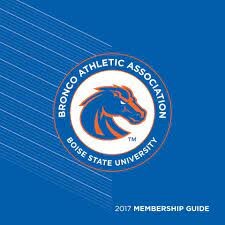
But Kathrine Switzer, who made headlines in Boston in 1967, is not. Nor is Meb Keflezighi, the 2014 champion.
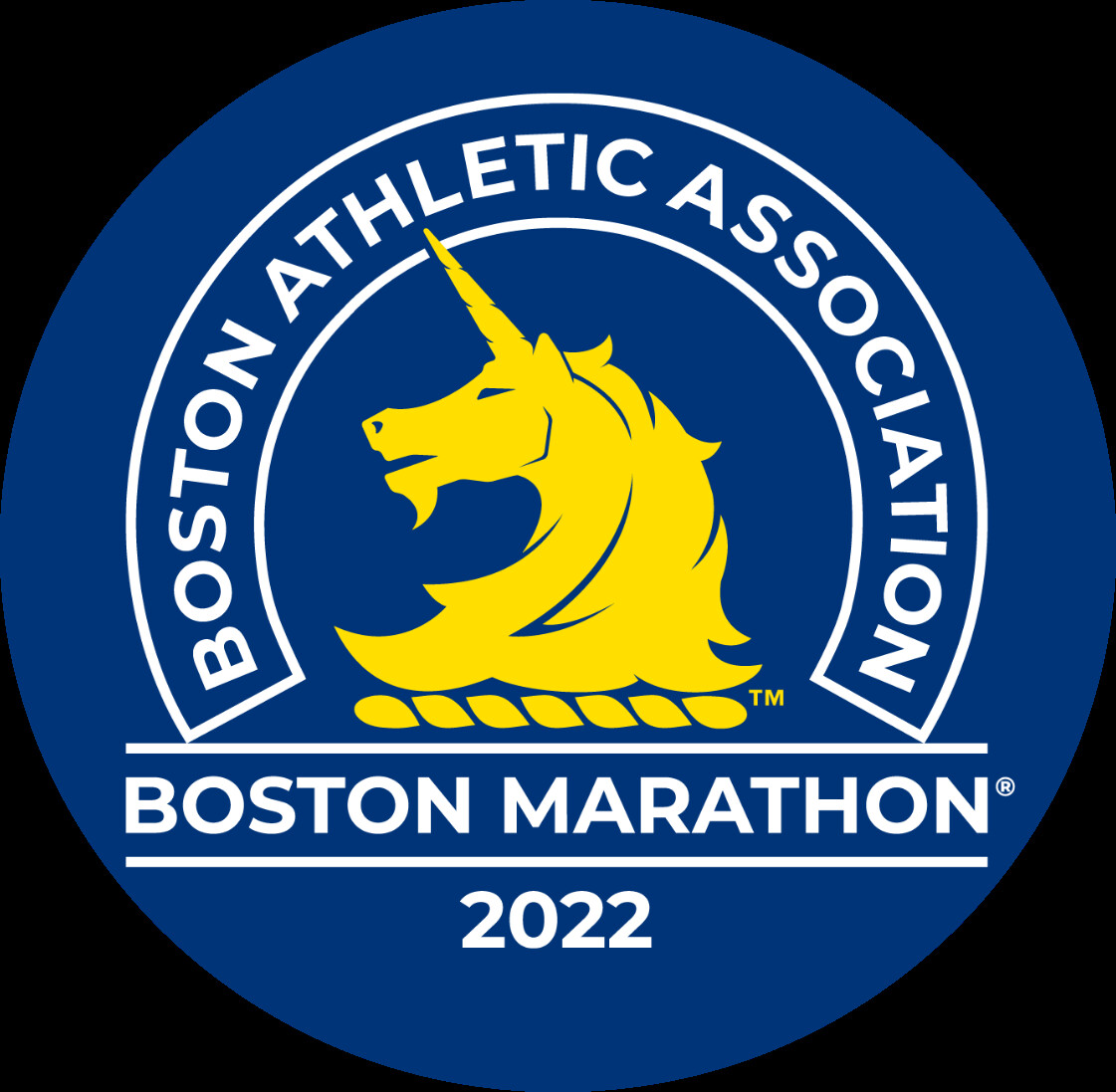
Tom Grilk, the CEO who retired in April, has been a member since 1987. The new CEO, Jack Fleming, is not.
Michael O’Leary, M.D., a surgeon at Brigham and Women’s Hospital and chairman of the B.A.A.’s Board of Governors (which is essentially the same as a board of directors) has been a member of the B.A.A. since 1989. All 13 Governors (10 men, three women) are members—they have to be, in order to be picked to serve on the board.
Scott Peterson, a Miami-area corporate finance professional, is a member, and he has his membership listed prominently on his LinkedIn profile. When asked by Runner’s World about it, Peterson, a marathon veteran, called the group “like-minded people who support the running community.” He said, “It’s a real honor for me and anyone to be part of the membership of B.A.A.”
But what is this selective group, exactly? Who are they? And how are they chosen?
A local mystery
Information about membership on the B.A.A. website is scant, which cloaks the group—intentionally or not—in secrecy. Several people who are deeply involved in the Boston-area running community told Runner’s World they did not know such a group existed. (There is also a B.A.A. Running Club, which is open to runners in the Boston area, but it is different from the membership.)
Chris Lotsbom, a B.A.A. spokesperson, answered multiple questions from Runner’s World about the membership via email. He said the group currently has 174 people.
He also explained that the membership model goes back to the B.A.A.’s founding in 1887. The marathon started 10 years later, in 1897.
The organization had, in its earliest days, a building with a pool, indoor track, bowling alley, and boxing room, among other amenities, like a golf club, for its dues-paying members. The B.A.A. was similar to other athletic clubs across the country, most notably the New York Athletic Club, which still exists.
In the 1930s, during the Great Depression, the B.A.A. lost its headquarters building and its other properties. All that remained was the marathon, the bylaws of the organization, and a small group of members.
The members kept the B.A.A. and the marathon going. And they remain to this day, written into the organization’s bylaws to promote “the common good and the health and welfare of the general public and the encouragement of the general public to improve their physical condition.”
Tom Derderian, executive producer of Boston: The Documentary and author of Boston Marathon: Year-by-Year Stories of the World’s Premier Running Event, takes a skeptical view of the leadership back in the day.
“The B.A.A. expected that their investments in the 1920s would continue to grow,” he wrote to Runner’s World. “The stock market crash and Depression and World War II removed all B.A.A. assets, leaving the Association with only its name, an indoor track meet, the Boston Marathon—and the founding attitude that only B.A.A. members could know what was best.”
The modern-day membership
Today, as with any group, some members are actively engaged in day-to-day matters of the organization, attending meetings, voting, lending expertise, or volunteering at B.A.A. events. Others are not involved at all.
“For us today, membership is a valuable asset when tapped into,” Fleming said in a call with Runner’s World. “There’s still work to be done, but leadership and staff rely on the members for a variety of things. They serve on committees. They provide guidance in areas, their expertise. So finance, real estate, of course, running, community, the professional side, technology.”
For example, when the B.A.A. wanted to buy a building in Hopkinton near the marathon starting line, the organization got real estate advice from some of the members during the process.
They have also helped with recent diversity initiatives.
“Several B.A.A. members were significant in the establishment of the Boston Running Collaborative, which seeks to increase the fitness and participation of minorities in running,” Lotsbom wrote. “In this respect, membership is a resource which complements the staff’s day-to-day work.”
The way the bylaws are written, the Board of Governors are nominated from the membership. So the 174 members influence the direction of the B.A.A. through the Governors, who oversee the CEO.
The B.A.A. doesn’t track the demographic makeup of the membership, but Lotsbom wrote that, since 2010, the group has attempted to improve its diversity.
Thaddeus Miles, who founded the Run to Wellness 5K in Roxbury several years ago, was invited to join the membership two years ago by Tom Grilk. Miles recently showed up at his first in-person membership meeting post-pandemic. He counted only one other Black member among what he estimates were 50 attendees, plus Adrienne Benton and Keith McDermott, who are on the Board of Governors.
Three people who are familiar with the membership said that many members work in the medical professions or financial services industry in the Boston area.
There is a family component as well, according to the B.A.A. O’Leary’s father, also a physician, was a member of the B.A.A. who was responsible for the physicals administered to marathon runners in Hopkinton during the race’s earlier years. A descendant of Walter Brown, who founded the Boston Celtics and was the B.A.A. president from 1941–64, still starts a division of the marathon to this day.
Members pay a nominal fee—$50—each year to belong. In exchange, they get one waiver each year into the marathon. They still have to pay the entry fee ($375), but they can run themselves without qualifying, transfer the waiver to a friend or family member, or donate the number to a charity.
Miles, who is on the steering committee of the Boston Running Collaborative, gives his waiver for a marathon entry every year to a runner of color who otherwise wouldn’t be able to qualify for the race.
For the thousands of runners every year who try to qualify but fail, or who fundraise for one of the charity teams as a way of gaining entry to Boston, the existence of a small membership group might rankle. Lotsbom said fewer than 180 entries are allocated for members annually (out of a field size of 30,000) and less than half are ultimately used.
“The B.A.A. gets to choose whom they want to invite to run the race, and the B.A.A. decides the terms by which it will invite people to participate in its iconic annual event,” said Robert Wang, the founder of the World Marathon Majors Challenge group on Facebook. (The group’s 18,000 runners are seeking to run all six of the Abbott World Marathon Majors, but they have no official affiliation with that organization.)
“If the B.A.A. wanted to invite everyone whose last name starts with ‘Y’ to run the Boston Marathon, that would absolutely be the organization’s prerogative,” Wang said.
I’d love to be a member. How do I sign up?
There’s the rub. Right now, no such sign-up mechanism exists. You have to know a current member or someone on the Board of Governors.
“Potential members are traditionally nominated by a board member or another current member, and apply with a résumé along with specific comments as to why they wish to join the B.A.A.,” Lotsbom wrote. “From there, the nominees are seconded by a Governor, and voted on by the board. The membership is made up of those who have expressed an interest in the B.A.A., B.A.A. activities, and its mission.”
Fleming acknowledged that the relative obscurity of the membership and the lack of clear guidelines for becoming a member could be improved.
“We should make it known more,” he said. “And we should have more public ways of making it easier to have their interest become known. Raise your hand. We should make it easier for that to occur.”
In an era when running’s leaders are trying to make the sport more inclusive, how does the B.A.A.’s membership fit into the landscape? Is it a quirky echo of the organization’s past? Or an impediment to diversity in today’s world? Does a quiet group of invitation-only members pass the sniff test in 2022?
Tiffany Chenault, a sociology professor at Salem State University who is an ambassador for the Boston chapter of Black Girls Run and part of the Boston Running Collaborative, said in a call that she didn’t recall hearing about the membership, and she wondered how much influence the group holds.
“I’m curious,” she said. “I have questions.”
John Hanc, a longtime Runner’s World contributing editor and author of The B.A.A. at 125: The Official History of the Boston Athletic Association 1887-2012, knew of the group’s role in the B.A.A.’s founding, but he didn’t realize it still existed.
“Today we know the B.A.A. for the marathon and its other major running events,” Hanc said.
“But we have to remember that its history is rooted in the 19th century. Back then, it was very much an athletic club, with all of the exclusivity and, by 21st century standards, perhaps unnecessary and stuffy protocol that came with institutions like it at the time. Over the decades, the organization has morphed into a powerful force in the modern running movement. But some vestiges of that past still remain. While we of course want to see greater diversity in every aspect of the sport, this remnant of the old B.A.A. strikes me as fairly harmless.”
The B.A.A. in 2022 is facing very modern challenges, however. John Hancock, the longtime marathon sponsor, announced that 2023 would be its final year. Will a company want to replace Hancock? And critics have said the B.A.A. has been slow to embrace diversity in its ranks and events. Where does the membership group fit into that?
Does a leadership structure that evolved from the 19th century, and with a Board derived from a membership group, still serve the organization?
Derderian isn’t certain.
“It is a human tendency for those in charge to conclude that only they know enough to be in charge, since they have always been in charge,” he wrote, “and to keep things from changing, they have to continue to exclude control from outside.”
by Runner’s World
Login to leave a comment
Jack Fleming has been named President and Chief Executive Officer of the Boston Athletic Association
The Boston Athletic Association (B.A.A.) announced today that Jack Fleming has been named President and Chief Executive Officer of the organization, effective immediately. Fleming brings more than three decades of experience at the B.A.A. to his new leadership role. His appointment follows a five-month-long national search.
“After a thorough process featuring a group of diverse candidates from across the country with various backgrounds, our Board decided that Jack was the best person for our organization based on his in-depth knowledge of the industry, the B.A.A. in particular, our athletes, and the communities we serve,” said Dr. Michael P. O’Leary, Chairman of the B.A.A. Board. “We are confident in Jack’s ability to take on this next challenge and thrive, moving our mission forward.”
“It is an honor to guide the Boston Athletic Association as we embark together on our next chapter, building upon our 135-year history,” said Fleming, who had been serving as acting Chief Executive Officer since May 1, 2022. “The B.A.A. has long been a leader in the sport of running and within Greater Boston. I have witnessed the unifying power that running can have in our community and look forward to a renewed and reenergized focus on our events, community initiatives, and programming. The entire B.A.A. team is committed to finding new and innovative ways we can lead and grow the sport as one.”
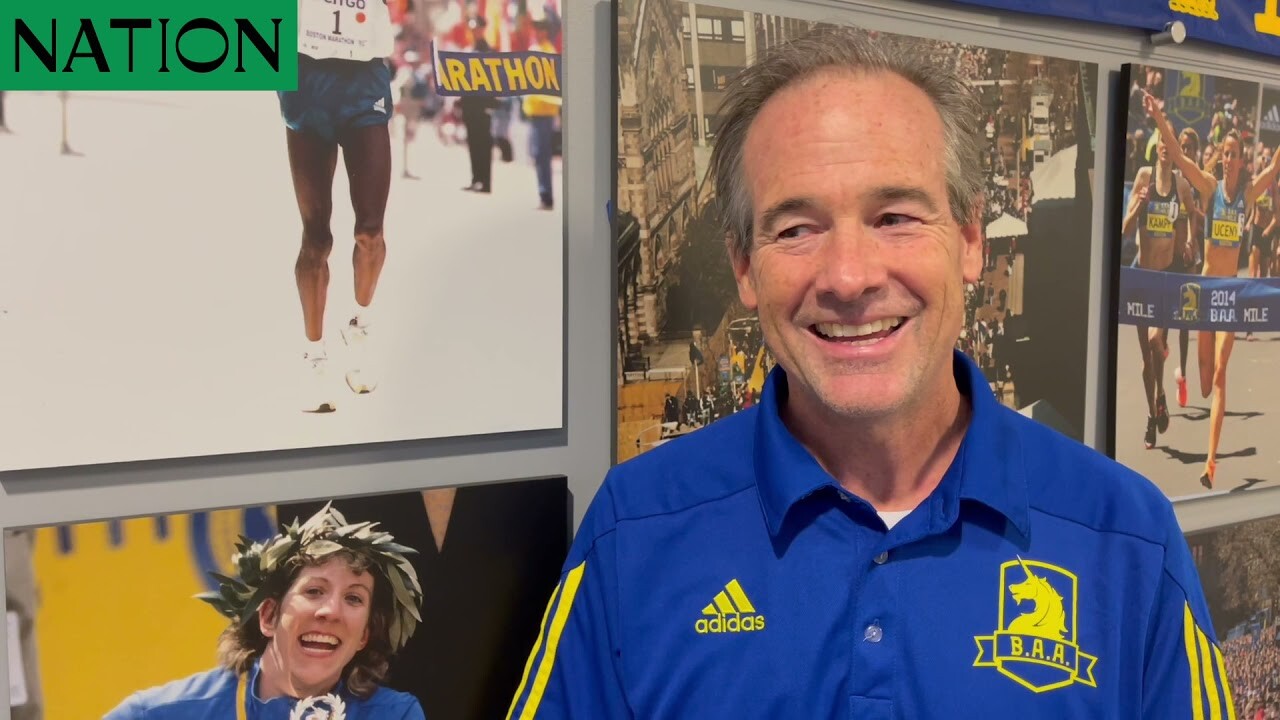
Prior to serving as acting Chief Executive Officer, Fleming was Chief Operating Officer of the B.A.A. from 2017 through 2022. Since 1992 Fleming has held a variety of roles within the organization, most notably within the communications, marketing, and sponsorship departments. As COO Fleming was responsible for managing the day-to-day operations of the B.A.A. and built a strategy that centered around the organization’s vision statement: Committed to a world where all people can access and benefit from running and an active lifestyle.
O’Leary added, “Jack’s contributions to the organization have been unprecedented, and we fully appreciate and understand his dedication and commitment to the B.A.A. as a whole. We have witnessed Jack’s continued growth since 1992, and his vision, enthusiasm, and knowledge make him perfect for this role.”
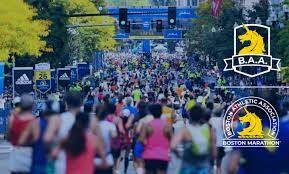
Prior to Fleming, Tom Grilk served as CEO/Executive Director from 2011 through 2022 as well as President from 2020-2022, while Guy Morse was Executive Director from 2000 through 2010.
ABOUT THE BOSTON ATHLETIC ASSOCIATION
Established in 1887, the Boston Athletic Association (B.A.A.) is a non-profit organization with a mission to promote a healthy lifestyle through sports, especially running. The B.A.A. is committed to a world where all people can access and benefit from running and an active lifestyle. The B.A.A. advances its mission and vision in a variety of ways, such as organizing mass-participatory running events like the Boston Marathon (the world’s oldest annual marathon), creating and supporting community fitness events, and sponsoring a running club that serves the greater Boston area.
The B.A.A. believes that everyone—no matter their race, gender, or background—should be able to advance their well-being safely and without fear or discrimination of any kind. The organization is committed to fostering a workplace and community that is diverse, equitable, inclusive and promotes a sense of belonging for all.
Login to leave a comment
Boston Marathon
Among the nation’s oldest athletic clubs, the B.A.A. was established in 1887, and, in 1896, more than half of the U.S. Olympic Team at the first modern games was composed of B.A.A. club members. The Olympic Games provided the inspiration for the first Boston Marathon, which culminated the B.A.A. Games on April 19, 1897. John J. McDermott emerged from a...
more...For the second year in a row, all runners who applied to run the Boston Marathon will be accepted into the race, as long as they have a valid qualifying time
For the second year in a row, everyone who qualified for and applied to the Boston Marathon will get to run.
The Boston Athletic Association (B.A.A.) announced on September 21 that there is no cutoff time for the 2023 race. Applicants who ran a verified qualifying time for their age group and gender during the qualifying period will be accepted into the race, which will be held on April 17, 2023.
The field size of the race is 30,000 runners, which will make the race the same size as the 2022 edition—and almost back to pre-pandemic levels. In 2020, before the pandemic canceled the race, the field size was set at 31,500.
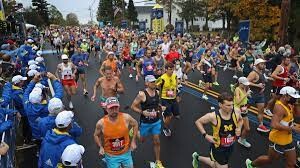
But runners have been slow to return to road racing—even as COVID-19 cases have dropped, vaccines and boosters have become widely available, and races have returned to the calendar.
Athletes cite the expense of race entry fees and the high cost of travel required to get to events, wariness about COVID-19, and shifting motivations as reasons why they’re not racing as frequently as they did in 2019 and the early days of 2020.
It appears even the Boston Marathon is not immune from these trends.
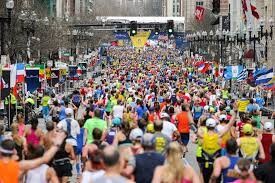
Usually 80 percent of the field, or roughly 24,000 spots, are reserved for time qualifiers. The other spots go to elite runners, those running for charity, and special invitational entries.
According to the B.A.A., the race had 23,267 applicants during this year’s registration period. The field of 2023 qualifiers is made up of 13,315 men, 9,930 women, and 22 nonbinary athletes.
In 2019, the B.A.A. received 27,288 applications for the 2020 Boston Marathon (which never happened, due to the pandemic). Application numbers have declined 14.7 percent from pre-pandemic levels.
The drop is in line with what other races are seeing across the U.S.—but somewhat surprising given Boston’s status as the Holy Grail among many marathoners.
Since the 2014 Boston Marathon, running a qualifying time has been no guarantee of entry into the race. Those who beat their qualifying times for their age and gender by the largest margins get in, while those who just squeak by with a qualifier have often been shut out.
Every year, runners eagerly await the announcement of the “cutoff” time—the margin by which you had to beat your qualifying time in order to gain entry into the race. In 2018, that cutoff reached 4:52 for the 2019 race, and more than 7,000 qualified runners who applied did not get in.
That September, the B.A.A. announced it was tightening the entry standards by 5 minutes across all age groups and genders.
Today’s announcement that there is no cutoff could also affect charities. In the past, many qualifiers who didn’t hit the cutoff ran the race for a charity. But with all verified applicants accepted, that reduces the pool of runners seeking bibs—and doing the required fundraising—for nonprofit organizations.
The 2023 race will be the 10th anniversary of the Boston Marathon bombings.
“On Patriots’ Day, the determination, passion, and unity of marathoners will be on display, bringing our community together in the spirit of athletics and our heritage,” said Jack Fleming, acting Chief Executive Officer of the B.A.A., in a release. “We are very much looking forward to the 127th running of the Boston Marathon in just seven months.”
by Sarah Lorge Butler
Login to leave a comment
Boston Marathon
Among the nation’s oldest athletic clubs, the B.A.A. was established in 1887, and, in 1896, more than half of the U.S. Olympic Team at the first modern games was composed of B.A.A. club members. The Olympic Games provided the inspiration for the first Boston Marathon, which culminated the B.A.A. Games on April 19, 1897. John J. McDermott emerged from a...
more...ESPN and WCVB has signed a deal with the Boston Athletics Association to provide exclusive year-round coverage for all their events including the Marathon
The Boston Athletic Association (B.A.A.) announced today that ESPN and WCVB Channel 5 will serve as the exclusive national and local broadcast partners, respectively, for the Boston Marathon beginning in 2023. WCVB will also provide exclusive year-round coverage for all B.A.A. events including the B.A.A. 5K, B.A.A. 10K, and B.A.A. Half Marathon.
“We’re honored to partner with ESPN and WCVB Channel 5, respected market leaders who bring a spirit of innovation and thoughtful storytelling that will propel the mission of the B.A.A. and legacy of the world’s oldest annual marathon forward,” said Jack Fleming, acting Chief Executive Officer of the B.A.A. “Both have established a tradition of broadcasting world-class athletic events, and we are excited to build on this tradition together into the future.”
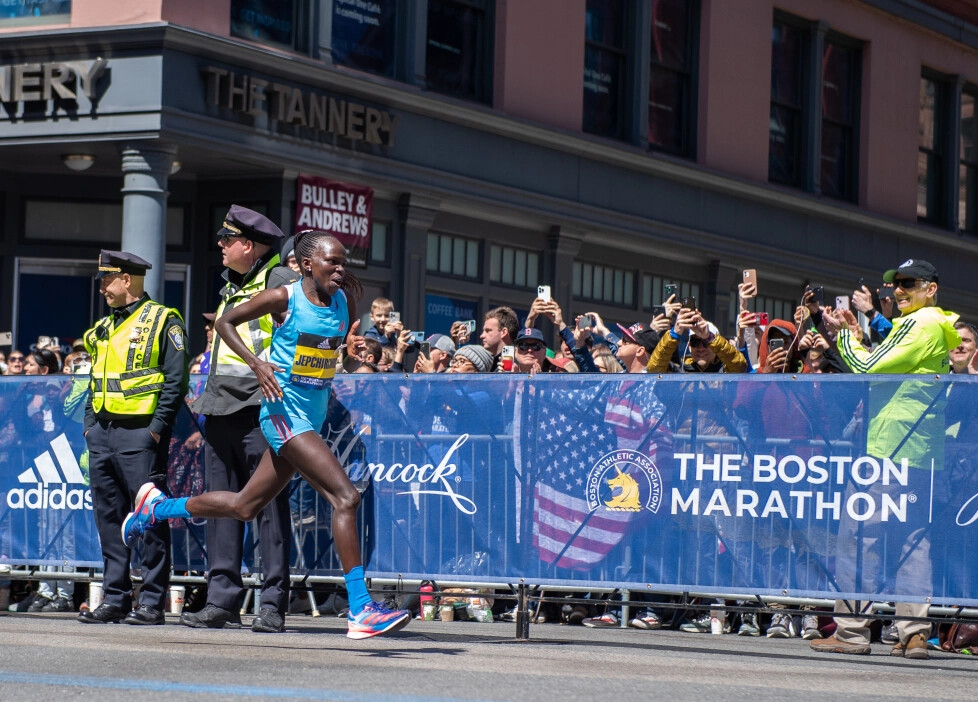
“The Boston Marathon is one of the world’s most recognizable and best-known sporting events and we’re proud to be able to bring it to ESPN viewers for years to come,” said Burke Magnus, President, Programming and Original Content, for ESPN. “We look forward to working with the B.A.A. and WCVB to present the stories and athletic achievements of this classic race.”
“The B.A.A. and the Boston Marathon are esteemed around the world and beloved by our community, and to be launching this exclusive partnership as WCVB marks 50 years in broadcasting and service to the community is especially fitting,” said Kyle I. Grimes, WCVB Channel 5 President and General Manager. “WCVB has a proud history of covering the market’s marquee events, and the Boston Marathon is the perfect addition to Channel 5’s signature, local programming. We also look forward to working with the B.A.A. year-round to highlight their many other athletic events as well as the great work they do in the community.”
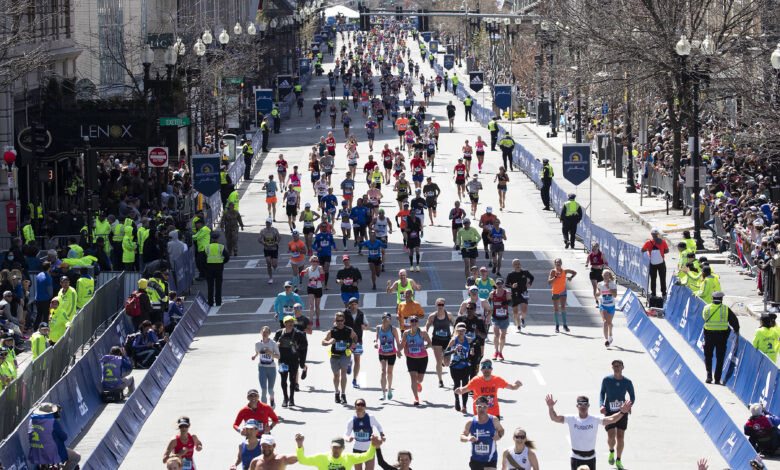
ESPN will broadcast the 127th Boston Marathon, scheduled to take place on Monday, April 17, 2023, on its flagship channel from 8:30 a.m. ET until 1:00 p.m. ET. In addition, ESPN will also have coverage of the race within SportsCenter before the live coverage and later in the day, as well as coverage appearing on other ESPN shows and platforms.
Live coverage of the Boston Marathon will air on WCVB beginning at 4:00 a.m. ET through 8:00 p.m. ET. The race will be exclusively simulcast regionally on WCVB Channel 5’s Hearst Television owned sister-stations WMUR (Manchester, NH), WMTW (Portland/Auburn, ME), and WPTZ (Burlington, VT/Plattsburgh, NY). WCVB and all of its television partners will provide coverage of the marathon on their digital platforms and mobile apps. The Boston Marathon will also be live streamed on Very Local Boston, and the streaming platform will host year-round content featuring the B.A.A. WCVB will also serve as the first-ever exclusive broadcast partner for the B.A.A.’s Distance Medley races and will provide year-round coverage of the B.A.A. and its races, with a focus on the Boston Marathon.
The partnership marks the return of the Boston Marathon to both ESPN and WCVB, with ESPN having aired the world’s most prestigious road race in the early 1980’s and then from 1997-2004. WCVB provided wire-to-wire coverage of the marathon from 1982 through 2006, including the largest Boston Marathon in history—the centennial Boston Marathon in 1996 featured 35,868 finishers.
Login to leave a comment
Boston Marathon
Among the nation’s oldest athletic clubs, the B.A.A. was established in 1887, and, in 1896, more than half of the U.S. Olympic Team at the first modern games was composed of B.A.A. club members. The Olympic Games provided the inspiration for the first Boston Marathon, which culminated the B.A.A. Games on April 19, 1897. John J. McDermott emerged from a...
more...127th 2023 Boston Marathon Field Size Established as 30,000 Participants and Registration to be held September 12–16, 2022
The Boston Athletic Association (B.A.A.) announced today that the field size for the 127th Boston Marathon, scheduled to take place on Monday, April 17, 2023, has been established as 30,000 participants. Registration will take place over five days, September 12–16, 2022.
“The 127th Boston Marathon will be another significant moment in B.A.A. history, as we recognize and honor the tenth anniversary of 2013,” said Jack Fleming, Acting Chief Executive Officer of the B.A.A. “On the third Monday in April 2023, athletes from around the world will gather with the resilience and spirit that has distinguished the Boston Marathon as the premiere event in road racing.”
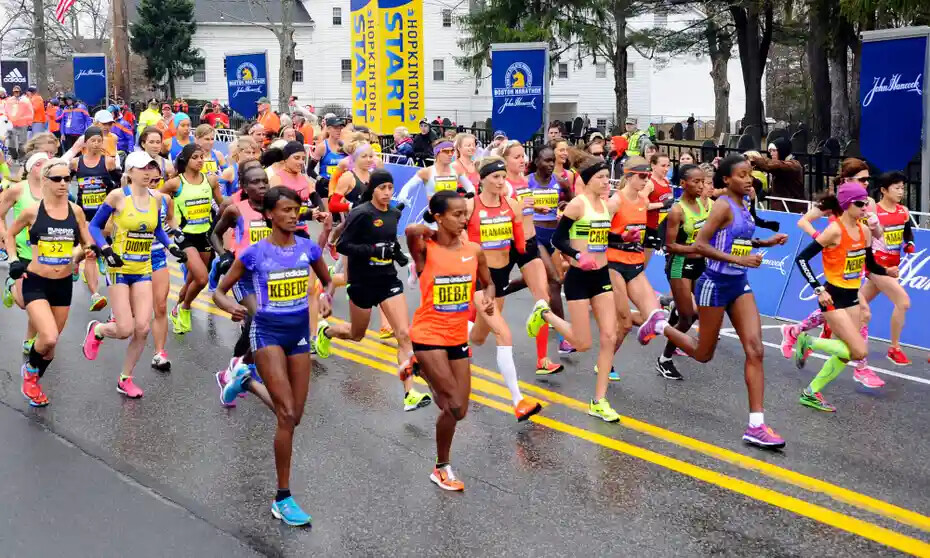
Registration will open on Monday, September 12 at 10:00 a.m. ET and will close on Friday, September 16, 2022 at 5:00 p.m. ET. The B.A.A. will use the same registration process for qualified runners as it used for the 2021 and 2022 races, allowing any athlete who has achieved a currently valid Boston Marathon qualifying time to submit a registration application between September 12–16, 2022 through the B.A.A.’s online platform, Athletes' Village.
Registration is not on a first-come, first-served basis and applications will be accepted until 5:00 p.m. ET on Friday, September 16. The 2023 Boston Marathon qualifying window began on September 1, 2021 and will close at 5:00 p.m. ET on Friday, September 16.
Qualifying standards for the 127th Boston Marathon can be found here. Qualifiers may submit an application at any point during the registration window. Achieving one’s qualifying standard does not guarantee acceptance into the Boston Marathon. Those who are fastest among the pool of applicants in their age and gender group will be accepted.
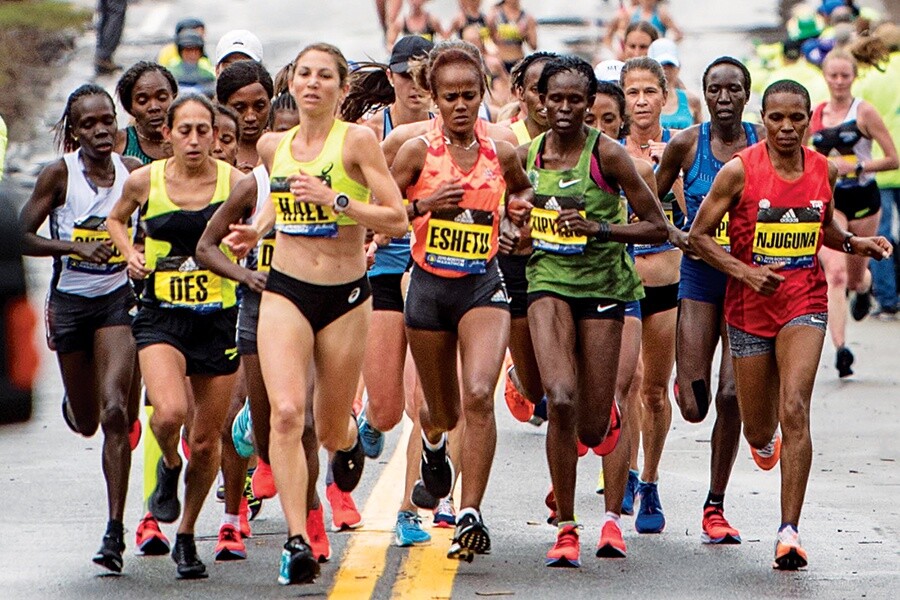
Entry fees and information on health and safety guidelines, including any COVID-19 policies, will be announced in the coming weeks. For the third straight year, participants will have the opportunity to purchase registration insurance at the point of registration.
The qualifying window for the 128th Boston Marathon, scheduled to take place on April 15, 2024, will begin on September 1, 2022. Registration details for that race will be announced following the 2023 Boston Marathon.
The next B.A.A. event is the B.A.A. 10K presented by Brigham and Women’s Hospital on Sunday, June 26.
Login to leave a comment
Boston Marathon
Among the nation’s oldest athletic clubs, the B.A.A. was established in 1887, and, in 1896, more than half of the U.S. Olympic Team at the first modern games was composed of B.A.A. club members. The Olympic Games provided the inspiration for the first Boston Marathon, which culminated the B.A.A. Games on April 19, 1897. John J. McDermott emerged from a...
more...Boston Marathon's unique running history honored with World Athletics Heritage Plaque
The Boston Athletic Association (B.A.A.), which organizes the B.A.A. Boston Marathon (1897), the world’s oldest annual marathon, officially unveiled the World Athletics Heritage Plaque awarded to the race in 2019.
The World Athletics Heritage Plaque is a location-based recognition, awarded for 'an outstanding contribution to the worldwide history and development of the sport of track and field athletics and of out-of-stadia athletics disciplines such as cross country, mountain, road, trail and ultra-running, and race walking'.
The official presentation of the plaque by World Athletics Heritage, which had been on hold due to the pandemic, took place in the race museum at B.A.A.’s HQ on Dartmouth Street, Boston, Massachusetts, where the plaque will be permanently displayed, and is adjacent to the finish line of the race.
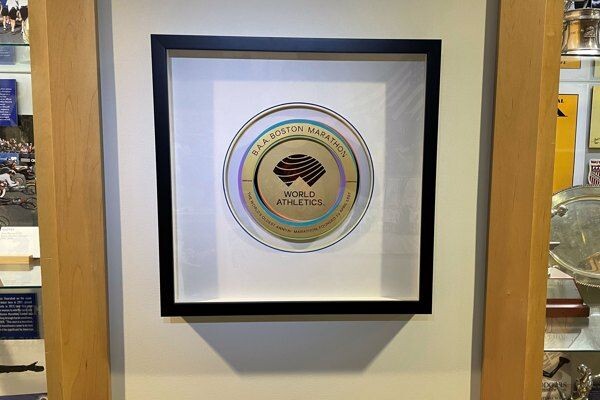
The plaque was unveiled by Thomas S. Grilk, B.A.A. President & Chief Executive Officer, and World Athletics Heritage Director Chris Turner, in the company of Jack Fleming, B.A.A. Chief Operating Officer, and fellow colleagues from the B.A.A. organization.
The tough one
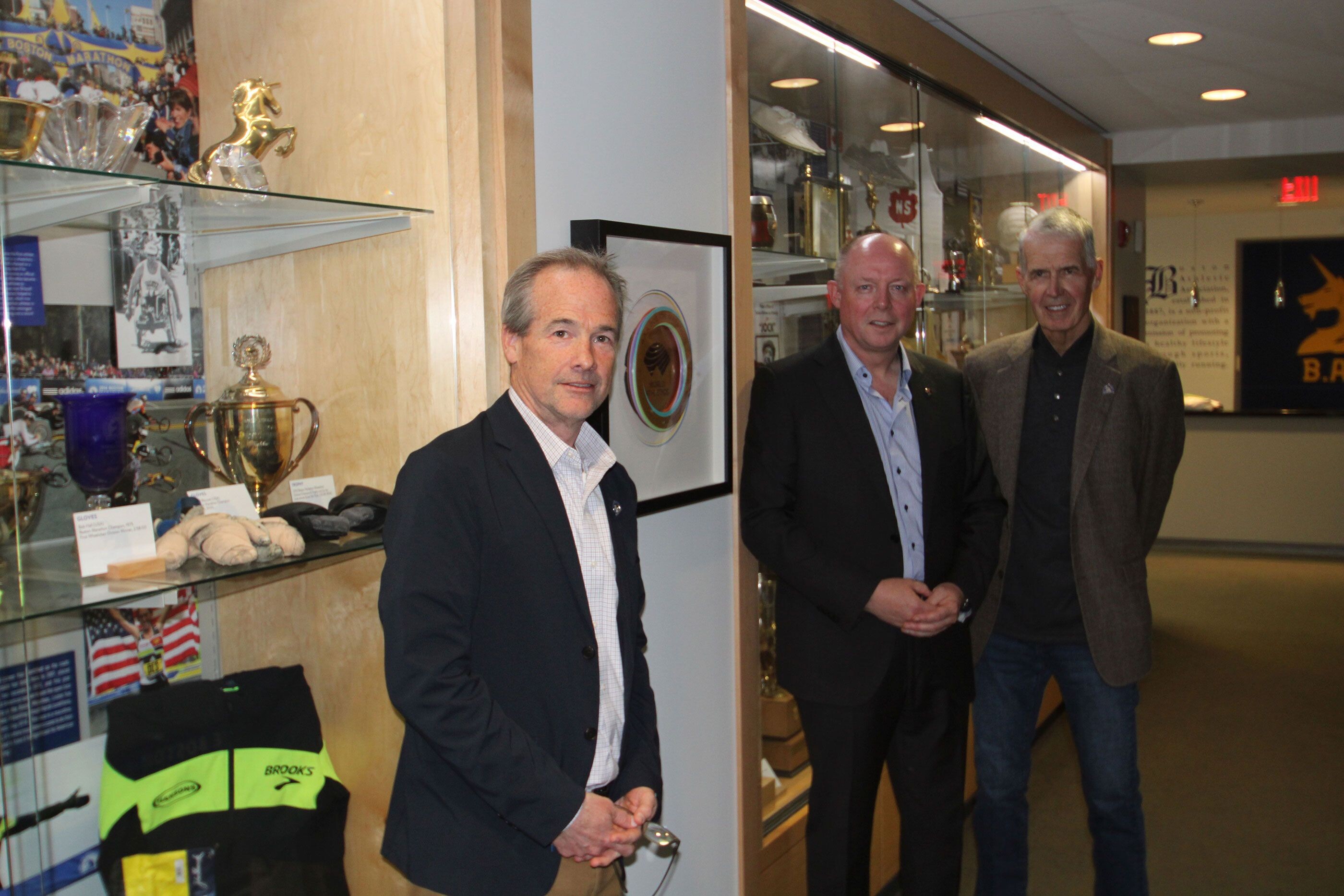
Boston’s notoriously demanding course, with its final incline ‘Heartbreak Hill’ 20 miles into the race that has gone down in marathon folklore, has floored many a world beater.
Amby Burfoot, the 1968 Boston Marathon champion, confirmed on Boston.com that the challenge is also “the downhill from the top of Heartbreak Hill to Cleveland Circle. This is called ‘Cemetery Mile’ for two good reasons: Evergreen Cemetery to the runners’ right, and the way the steep downhill deadens the legs, specifically the quadriceps muscles.”
Notably, despite the stature of the race, only five Olympic champions have ever managed to win in Boston.
Four women, firstly two-time Boston victor Joan Benoit (1979, 1983), who won the 1984 Olympic title in Los Angeles, and two three-time winners in Ethiopia's Fatuma Roba (1997, 1998, 1999), the Atlanta 1996 champion; Portugal's Rosa Mota (1987, 1988, 1990), who took the Olympic title in Seoul in 1988; and Kenya's 2022 Boston winner Peres Jepchirchir, who was the Olympic victor in Tokyo.
The sole male runner so far to accomplish the rare double is Italian Gelindo Bordin (1990), the Seoul 1988 Olympic champion, who took first place in Boston two years later.
The ‘American Marathon’
The racing singlets, running shoes, medals and trophies and hundreds of pieces of historic memorabilia in the B.A.A.'s museum pay tribute to the city’s famous marathon, which was inspired by and founded a year after the running of the inaugural Olympic marathon at the 1896 Games in Athens.
The B.A.A. itself had been established 10 years before. It was one of the association’s members, John Graham, who, as USA team manager at those 1896 Games witnessed the marathon race, proposed creating a similar long distance race in Boston.
The race, originally called the American Marathon, has an annual Monday date which makes it unique among elite international marathons. The Boston Marathon has always been held on the holiday commemorating “Patriots’ Day”, which since 1969 has become officially recognized as the third Monday in April.
The B.A.A., which has a mission to promote a healthy lifestyle, especially through running, has its HQ and museum virtually located at the finish line of the marathon.
Running treasure trove
The plaque, which is mounted on a wall in its own showcase in the museum, has joined a verifiable treasure trove of distance running artefacts associated with the race’s storied history.
The B.A.A.’s collection of memorabilia and its archive is always growing. In fact, they recently received a gift of a rare finisher medallion from the 1903 Boston Marathon. The competition bib number of last week’s Boston winner Jepchirchir is the very latest acquisition.
The perpetual Champions’ Trophy, which the winners receive immediately following the Boston Marathon, and the second place award (mounted plaque) from the first B.A.A. Boston Marathon in 1897 are standout exhibits.
Poignantly, the 2013 champion's medallion won by men’s victor Lelisa Desisa of Ethiopia was gifted back to the City of Boston in the summer of 2013, shortly after the notorious bombings which occurred on marathon day that year.
The collection, which contains hundreds of artefacts and thousands of images, has recently been renamed as the Gloria G. Ratti Collection in posthumous recognition of their long-time archivist and historian. Ratti was a B.A.A. Vice President on the Board of Governors.
by World Athletics
Login to leave a comment
Boston Marathon
Among the nation’s oldest athletic clubs, the B.A.A. was established in 1887, and, in 1896, more than half of the U.S. Olympic Team at the first modern games was composed of B.A.A. club members. The Olympic Games provided the inspiration for the first Boston Marathon, which culminated the B.A.A. Games on April 19, 1897. John J. McDermott emerged from a...
more...The Boston Marathon unicorn is a mythological figure that is meant to be pursued
Login to leave a comment


